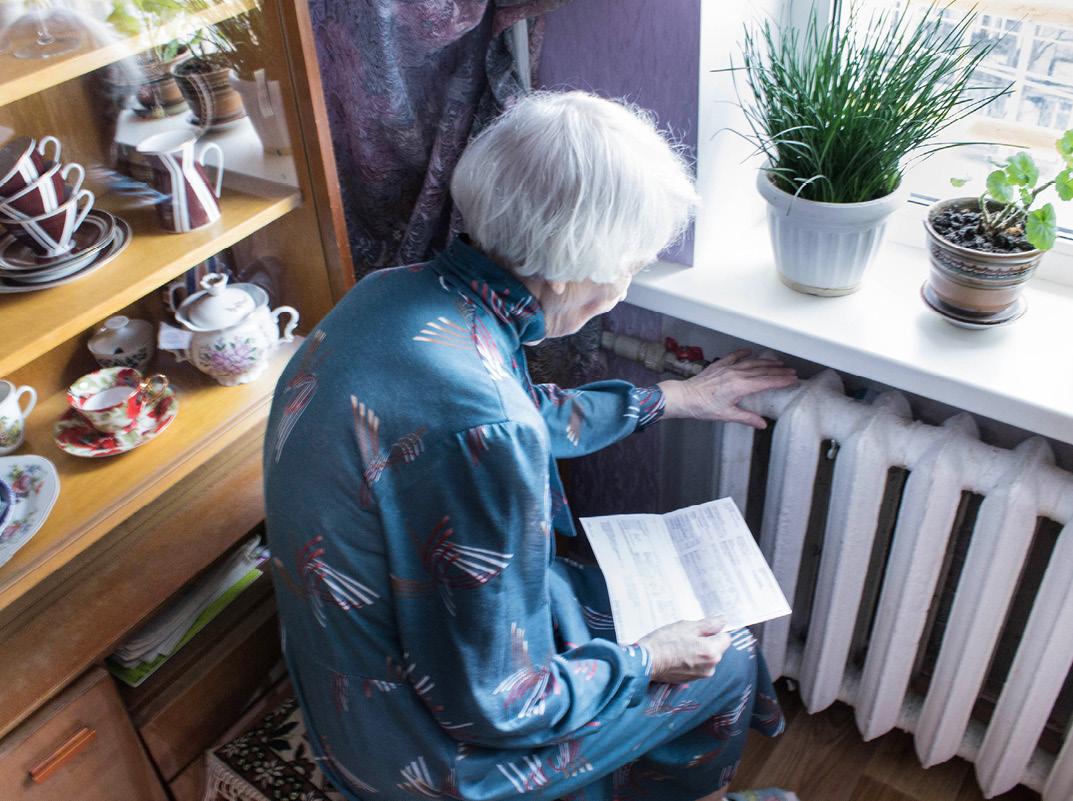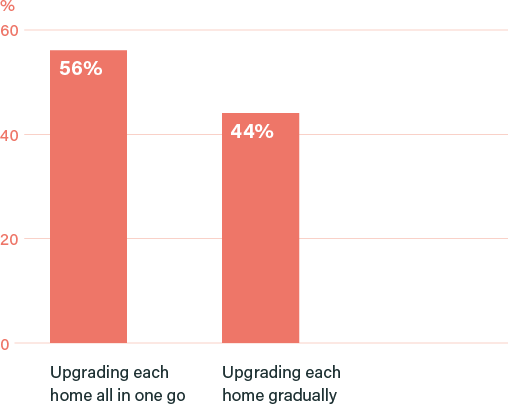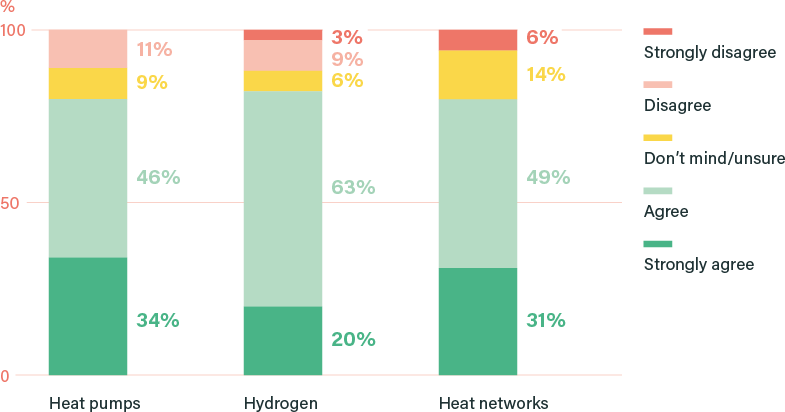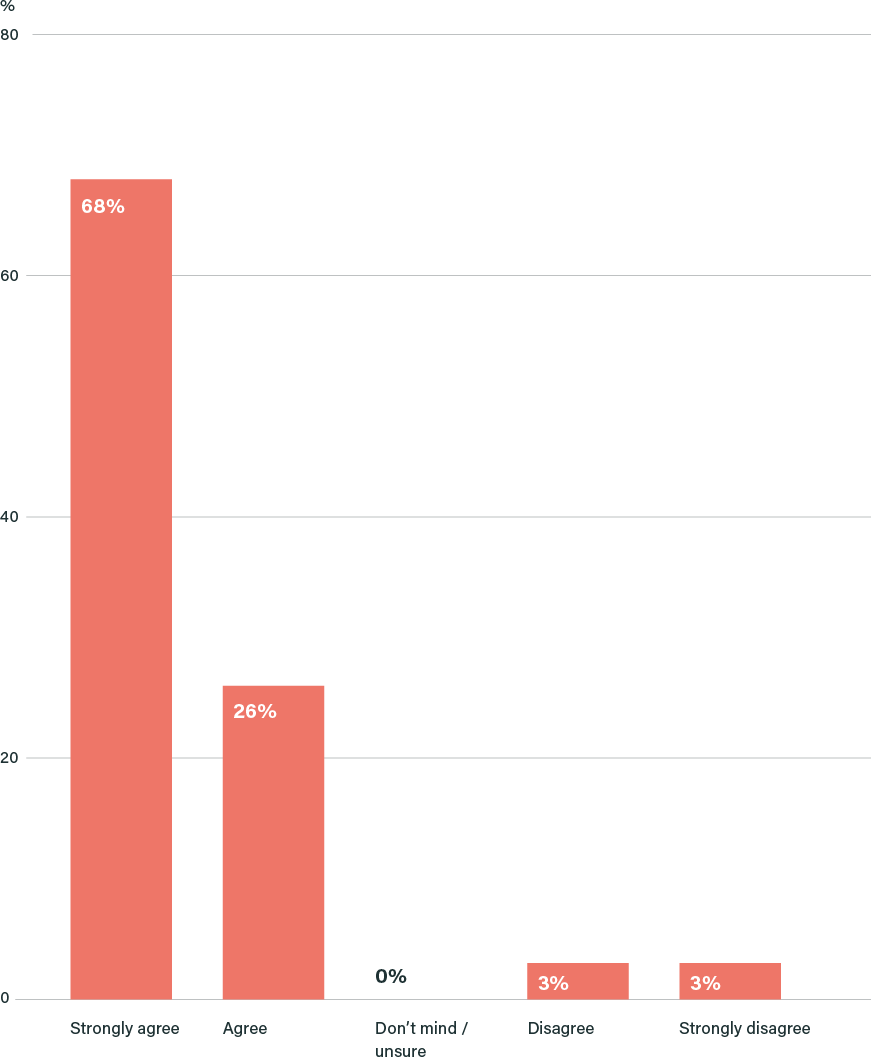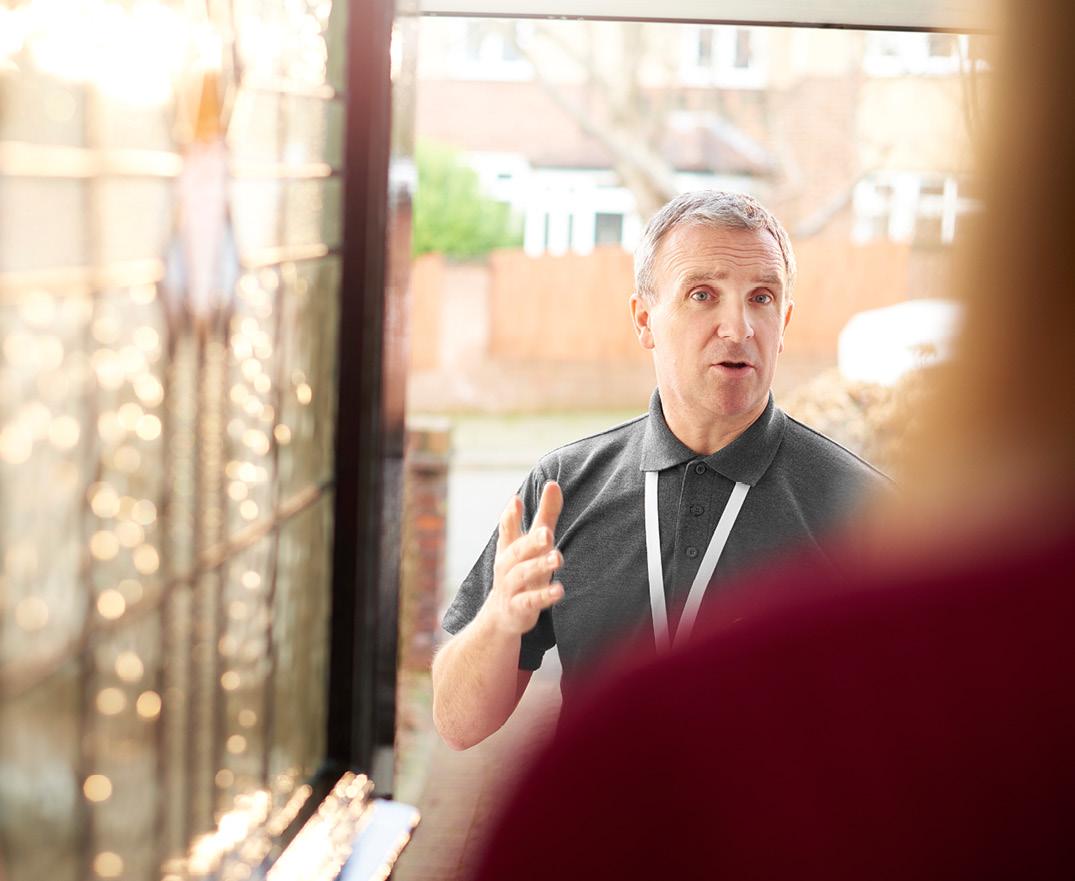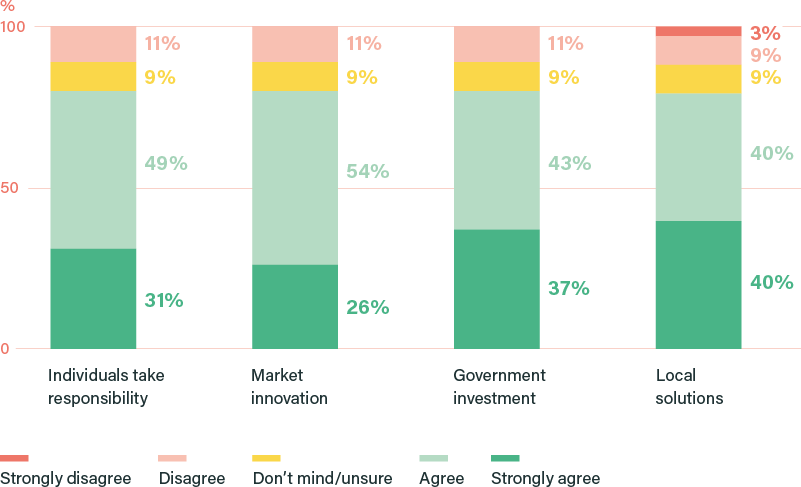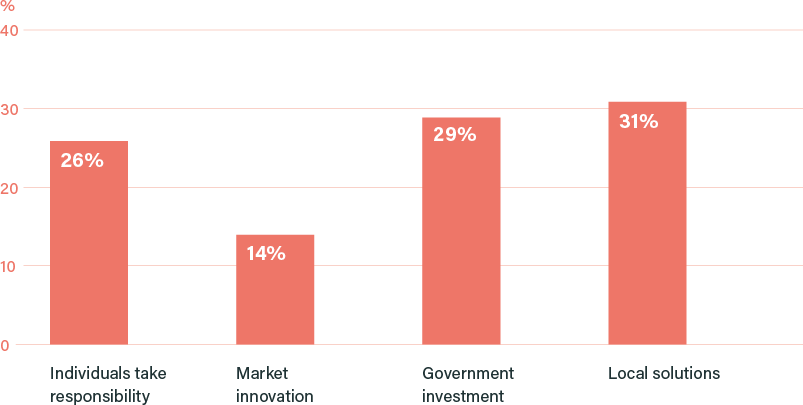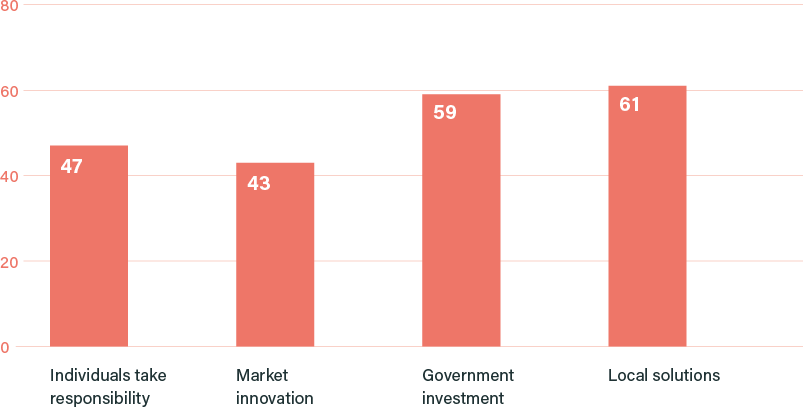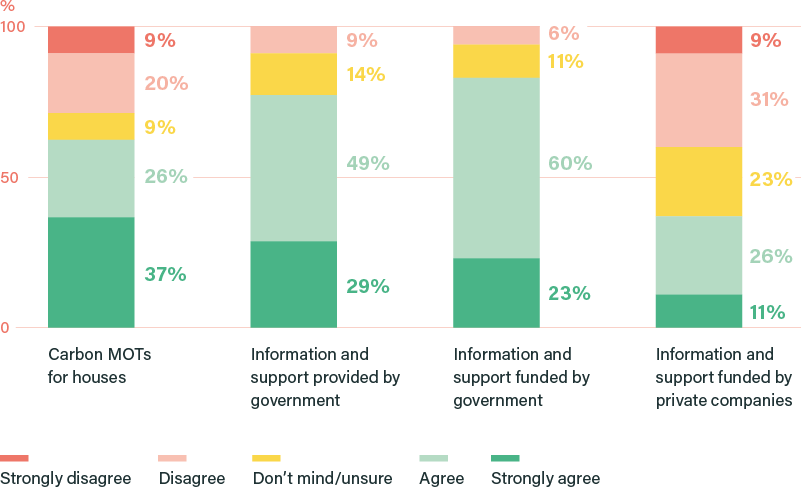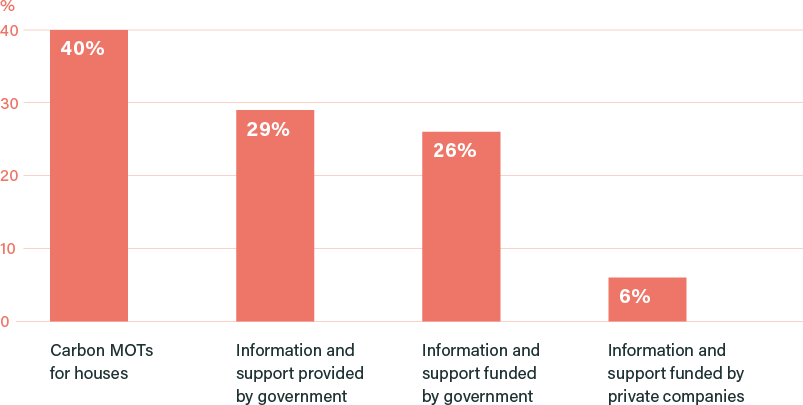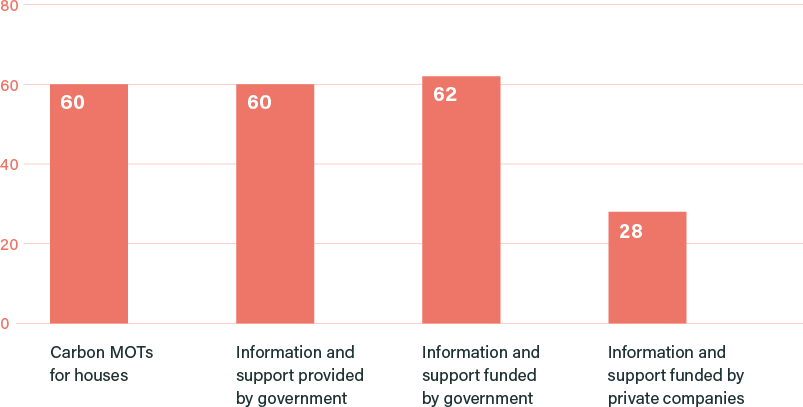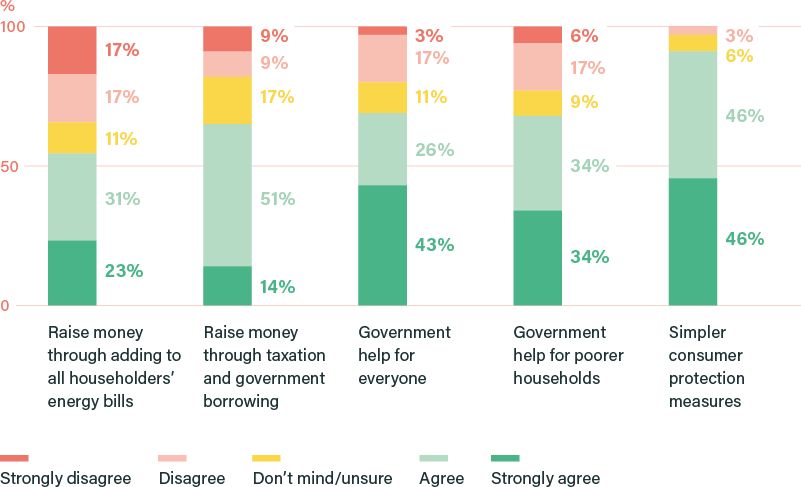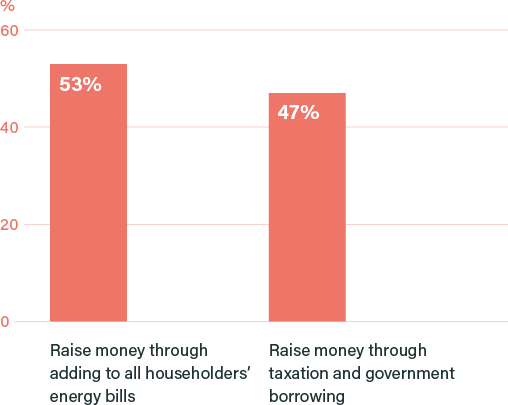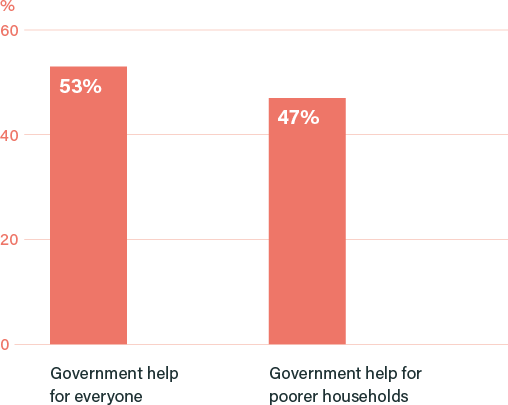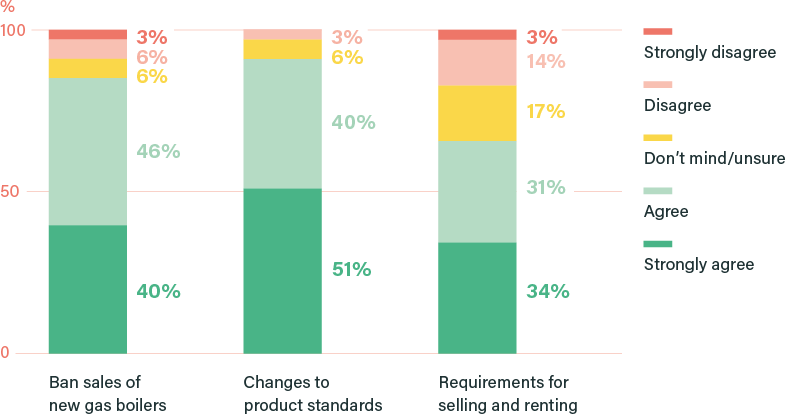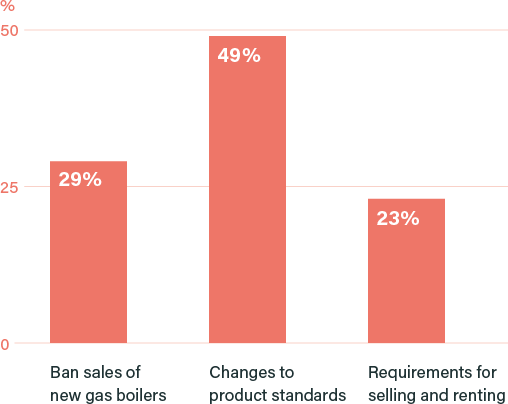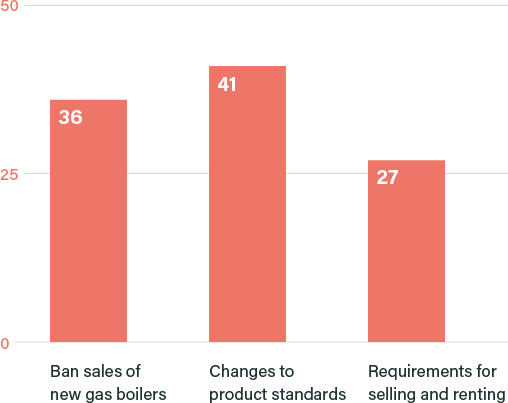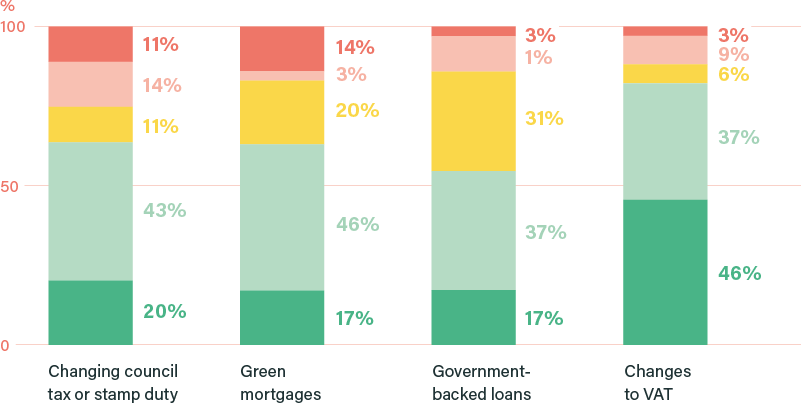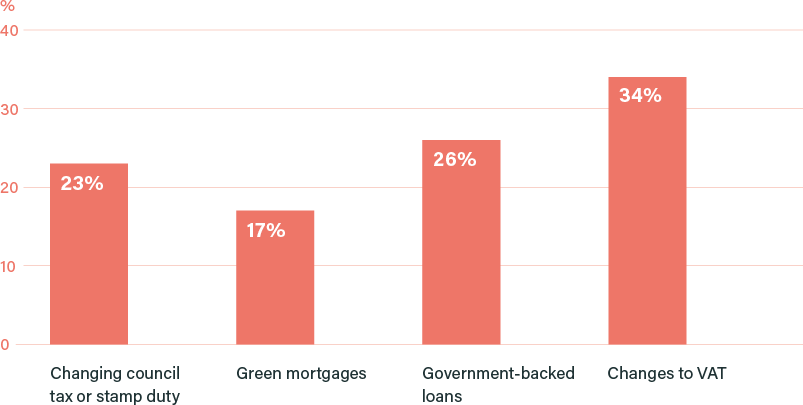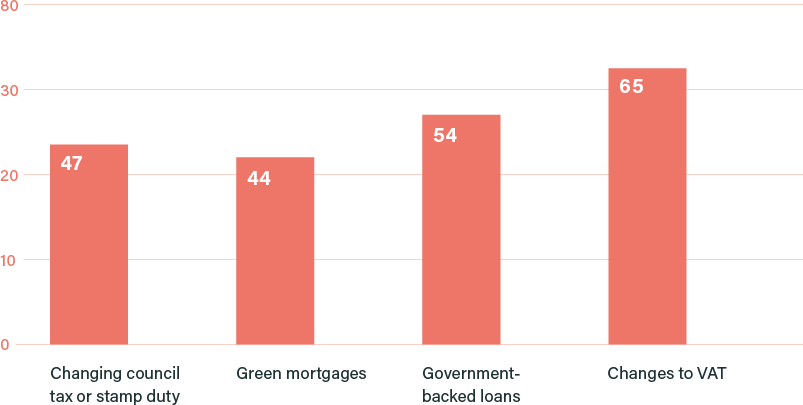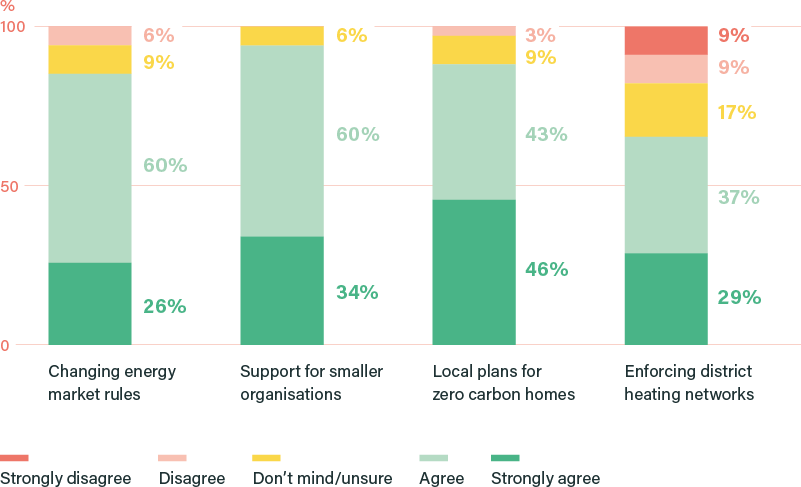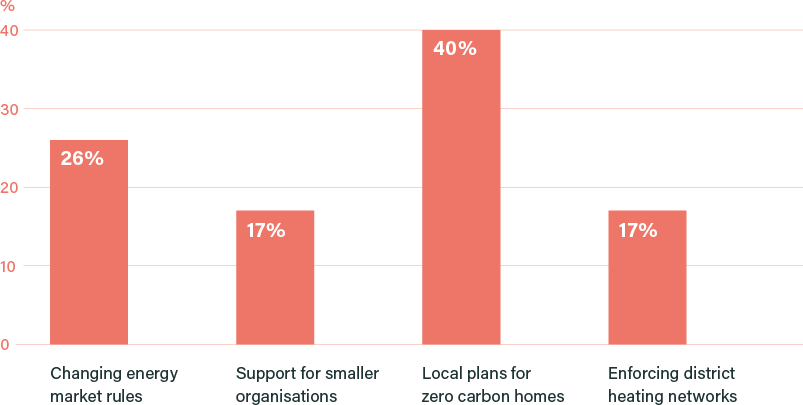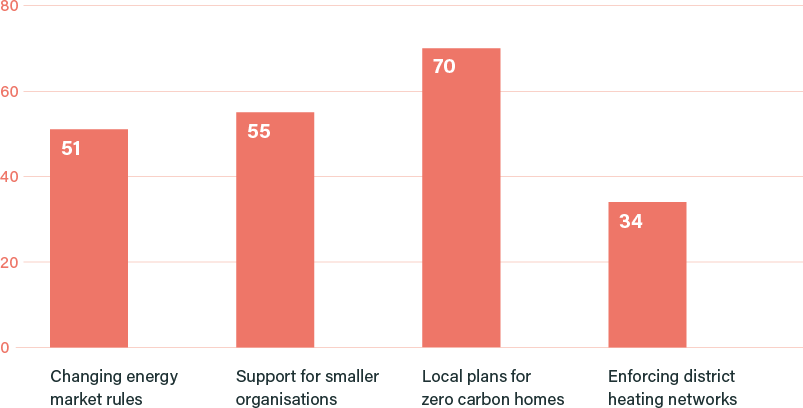In the home

Previous section: How we travel by air
(Contents)
- Assembly members emphasised the need for a long-term strategy with a wide range of actors taking steps to move the sector towards net zero. Assembly members strongly supported roles for government investment (80%), local solutions ( 80%), individual responsibility (80%) and market innovation (80%).
- A majority of assembly members 'strongly agreed' or 'agreed' that 19 policy measures on heat and energy use in the home should be part of how the UK gets to net zero. Policies supported by at least two-thirds of assembly members were:
- Support for smaller organisations to offer energy services (94%);
- Simpler consumer protection measures (92%);
- Changes to product standards to make products more energy efficient and 'smart' (91%);
- Local plans for zero carbon homes (89%);
- A ban on sales of new gas boilers from 2030 or 2035 (86%);
- Changes to energy market rules to allow more companies to compete (86%);
- Changes to VAT on energy efficiency and zero carbon heating products (83%);
- Information and support funded by government (83%), or information and support provided by government (72%);
- Government help for everyone (69%) or government help for poorer households (68%);
- Enforcing district heating networks (66%).
- In their discussions, assembly members emphasised their support for tailored solutions for local areas and individual households; increased choice, including through steps to promote competition; and reliable and clear information for the public. They stressed that changes need to work for all income groups and housing types. Some noted concerns about the influence and behaviour of big companies, and around use of personal data.
- On home retrofits, assembly members emphasised the need to minimise disruption in the home, put in place support around costs, and offer flexibility and choice to homeowners. They showed a slight preference for upgrading each home all in one go (56%), compared to upgrading each home gradually (44%) but attached conditions to the former around how it is financed. Some also stressed that this should be a choice for homeowners.
- The best technology to use for zero carbon heating is a matter of significant policy debate. However at least 80% of assembly members 'strongly agreed' or 'agreed' that each of hydrogen (83%), heat pumps (80%), and heat networks (80%) should be part of how the UK gets to net zero. 94% of assembly members 'strongly agreed' or 'agreed' that 'people in different parts of the country should be offered different solutions to zero carbon heating.'
- The 23 considerations for government and Parliament that assembly members identified at the start of their discussions – along with the rationale and conditions assembly members noted throughout – provide a valuable guide for policy-makers working on heat and energy use in the home and the path to net zero.
Climate Assembly UK's 'in the home' theme focussed on changes that are needed to the use of heating, hot water and electricity in the home to reach net zero greenhouse gas emissions.
At the moment, the main sources of greenhouse gas emissions in the home are:1
- Using fossil fuels (gas, oil and coal) for heating, hot water and cooking. Heating needs are greater if homes are not well-insulated. Many homes in the UK are currently poorly insulated;
- Using electricity to power lights and electrical appliances (e.g. fridges, freezers, dishwashers, tumble dryers, IT equipment, TVs etc). At the moment, some of this electricity is generated by burning gas and coal.
Around 15% of the UK's greenhouse gas emissions come from the residential sector.2
Thirty-five assembly members considered the topic of heat and energy use in the home. We selected these assembly members from the assembly as a whole using random stratified sampling. This ensured that they remained reflective of the wider UK population in terms of both demographics3 and their level of concern about climate change.
Notes ():
3: Age, gender, ethnicity, educational qualification, where in the UK they live and whether they live in an urban or rural area.
These assembly members heard a wide range of views on the future of heat and energy use in UK homes, and how we might move towards that future. They had the opportunity to question each speaker4 in detail. These evidence sessions took place at weekend two of the assembly.
Notes ():
4: The assembly heard from ten speakers on 'in the home': Jenny Hill, Committee on Climate Change (informant); Professor Nick Eyre, University of Oxford (informant); Richard Lowes, UK Energy Research Centre (advocate); Chris Clarke, Wales and West (advocate); Professor Rebecca Willis, Lancaster University (informant); Polly Billington, UK100 (advocate); Jonathon Atkinson, Carbon Co-op (advocate); Dan Alchin, EnergyUK (advocate); Matthew Lipson, Energy Systems Catapult (advocate); Dhara Vyas, Citizens' Advice (advocate). All speakers' presentations are available as slides, videos and transcripts at climateassembly.uk/resources/. An 'informant' is a speaker who we asked to cover the range of views and available evidence on a topic. An 'advocate' is a speaker who we asked to give their own view, or the view of their organisation. Assembly members knew whether speakers were informants or advocates.
Assembly members spent weekend three of the assembly discussing the evidence they had heard and their own views in-depth, before reaching conclusions on five separate areas:
- Considerations: the overarching considerations that government and Parliament should bear in mind when making decisions about heat and energy use in the home;
- Retrofit: whether upgrades to each home to reduce energy use (for example, to improve insulation) should happen gradually or all in one go;
- Zero carbon heating: what technology or combination of technologies should be used to replace gas central heating, and whether or not different parts of the country should be offered different solutions.
- Futures : an overarching view of how to make change happen around heat and energy use in UK homes;
- Policy options: which specific policies should be used as part of this future.
Assembly members also had the opportunity to discuss and add anything else they wanted to say to government and Parliament about heat and energy use in the home and the path to net zero. Assembly members' views on the implications of Covid-19 for this topic are touched on in Chapter 10.
Assembly members reached their first decisions on 'in the home' by discussing their answers to the following question:
What considerations should government and Parliament bear in mind when making decisions about heat and energy use in the home and the path to net zero?
Assembly members thought about their answers to this question individually. They then discussed their views in small groups at their tables, with each table agreeing their eight top considerations. These top considerations had to, between them, represent the range of views at the table.
Facilitators took the top considerations from each table and grouped similar options together to create a list on which assembly members could vote. They checked this list back with assembly members to make sure they had accurately reflected their views. This included making any necessary adjustments. Each assembly member voted for the six options that they felt to be most important.
The results were as follows. The wording of the considerations in the table is either word for word what assembly members wrote on their option cards or, where facilitators combined similar options from several tables, how we described the options to assembly members prior to the vote.
| Rank | Consideration | % assembly members who chose it as a priority |
|---|---|---|
1 | Strategy needs to be enforceable by government, and binding for future governments.[^5]A guaranteed long-term safety guard (including for industry) | 60 |
2 | Make this work for everyone. All housing types and geographies (urban and rural) Some assembly members asked to avoid “mak[ing] the poor poorer by loading costs on to them”, with others noting the need to pay attention to “people whose livelihoods will be affected (e.g. heating engineers and farmers).” Some said solutions need to work for both tenants and owners. Other assembly members talked about “infrastructure challenges” including “rural areas …[not having] ready-made pipework in the ground”, disruption caused by “dragging up streets” and the idea that “one size doesn’t fit all.” | 54 |
3 | Education and good communication should build awareness to enable people to make informed decisions Some assembly members suggested this was important to “overcome the challenge of lack of trust in government messages.” Others advised “don’t sell it as ‘dealing with climate change’ but as making a cleaner planet.” Some assembly members suggested that part of the solution could be “more education in schools, colleges.” | 51 |
4 | Have imaginative solutions/incentives to make work financially viable Some assembly members suggested the following: “loans that can be paid off through your bills”, “lower stamp duty for efficient homes”, “connect EPC rating with significant tax subsidy”, “setting up a big charity with big philanthropy money.” Others suggested “using milestones to force change (like TV switchover)” and “making the transition seamless for consumers.” | 46 |
5 | Learn from others and avoid making expensive mistakes Some assembly members talked about a need to “plan things correctly, with everyone’s voices/input to avoid expensive mistakes or revisions and with a phased approach and clear principles.” Others said “government and Parliament need to consider learning from elsewhere to ensure planned, effective changes with clear deadlines (with urgency).” | 43 |
6 | The onus should be on producers/manufacturers, rather than consumers, to:
| 40 |
7 | Solutions should be affordable for all consumers in all circumstances Some assembly members said this should include “helping ‘everyday folk’ (people who would not normally be considered vulnerable).” Others said it “needs to be fair and financially viable for all households.” | 37 |
8 | Minimum standard for all homes | 31 |
=9 | Make best use of the role of local authorities Some assembly members suggested that this included local authorities “using their [area’s] range of natural resources.” Others said to “give local authorities power, but make them more accountable to local people, e.g. via citizens assemblies.” | 29 |
=9 | Solutions should be tailored to local and individual needs | 29 |
11 | Need to consider impact on jobs, including retraining and retention Some assembly member noted the “impact on jobs, including local jobs,” suggesting a need to “sustain skill-set[s] as technology progresses.” Others said that “industry professionals will require retraining” and that this “should be affordable e.g. [retraining for] boiler/gas technicians on new boilers.” | 23 |
=12 | Solutions should focus on reducing energy consumption and improving efficiency | 17 |
=12 | Ensure that changes made and any new technology are well-researched and sustainable in the long-term | 17 |
=12 | Consider the health benefits of change | 17 |
=15 | Cost of manufacturing and disposal (including carbon cost and price) | 14 |
=15 | Government and Parliament need to consider legislation that ensures transparency and fairness in lobbying and influencing | 14 |
=17 | We need cross-political party solutions | 11 |
=17 | Support vulnerable groups with advice and financially | 11 |
=17 | Getting the right balance to ensure we build, recycle and upgrade products to deliver the best outcomes Some assembly members asked “can we upgrade/update instead of [going for] full replacement.” | 11 |
=20 | Consider adapting Section 106 to include a pot of cash for home insulation | 9 |
=20 | Government and Parliament need to consider disincentivising fossil fuels for homes | 9 |
22 | Businesses need to be transparent and reinvest profits/not make huge profits | 6 |
=23 | Practical, achievable and doable solutions implemented by government | 3 |
=23 | Need to consider health and safety of interventions to ensure no negative effects on health e.g. from insulation or technologies Some assembly members suggested “regulation of products and installation to ensure safety and no negative effects on health.” | 3 |
The first topic assembly members looked at was retrofit. This means making improvements to homes to reduce energy use, such as insulating lofts and walls and reducing drafts from windows. Speakers at weekend two of the assembly told assembly members that significant energy efficiency improvements need to be made to most of our homes over the next few years.
Assembly members discussed whether it would work best to:
- Upgrade each home all in one go – meaning all improvements to a home (insulation, heating etc) would be done at the same time;
- Upgrade each home gradually – meaning improvements to a home would be done gradually over a longer period.
Assembly members discussed these options in small groups, before voting by secret ballot.
We start by presenting the rationale for their views, taking each scenario in turn.
Assembly members felt that this option had both pros and cons, and expressed these in their discussions and on their ballot papers. Some assembly members also suggested 'conditions' that should be met if this option went ahead.
Pros
- Shorter period of disruption – a significant number of assembly members liked that there would be "shorter disruption", "less disruption overall", "less disruption long-term", or that it would be "out of the way quicker." Some said there would "only [be] one period of disruption", that "all the upheaval [would be] in one go", or that when "it's done, disruption is finished." Some said you "don't have to remove walls/floors multiple times" or "redecorate at every stage." Others that the "disruption to [the] family lessens", that it would "reduce [the] duration of family stress and lifestyle disruption" or that it "makes more sense to me to disrupt my family life once." Some commented that it "wouldn't be as disruptive if suited to [the] householder's lifestyle."
- Reduced CO2 – some assembly members suggested it was "the fastest way to drastically reduce CO2 emissions", that "benefits to carbon [would be] seen quicker", or that there would be "quicker carbon savings." Some said or that there "would be more noticeable change to net zero if houses were insulated very quickly", "immediate benefits in terms of net zero" or that it would be "quicker for households and [the] whole country to move forward in terms of carbon."
- Cheaper – some assembly members thought this would be "cheaper", "cheaper overall" or that the "overall price would probably be cheaper." Some suggested that it "may be cheaper if funded by government/local government – can negotiate a good deal", or that "if government paid for social housing, [it] would drive energy efficiency and save taxpayer money in [the] short and long run."
- Cost savings – some assembly members felt people would be "saving on energy costs sooner", that there would be "bigger energy savings straight away" or that people would "save costs with lower bills." Others suggested that people would "start saving £ quicker and more."
- Improved housing – some assembly members said that "homes [would be] more efficient after [the retro]fit" or that it would result in "more comfortable homes."
- "One central point for coordination, complaints etc"
- "Commitment from government – no risk they can go back on it later"
- "More jobs (from new home options)"
- "Improving house – would all be done e.g. if wanted to sell"
- "…at least I know what the total cost is"
- "Because of the need to act quickly and for all groups (government, individuals, firms) to be held to account"
Cons
- Cost – some assembly members disliked that it would "cost a lot in one go", that you "have to pay it all at once" or that the "costs will come all at once – people may not be able to afford it." Some said it's "expensive", that it would be "too expensive for some people – would put people off", or that it's "better for people with large savings." Some disliked the "larger financial outlay" or the "cost of installations." Some assembly members said there would be a "loss of rental income" or asked "where is the money coming from" or "how will the money be found (i.e. expensive tower blocks)." One assembly member commented that "if homeowners are funding it, government can't mandate they get into debt, spend savings, disrupt their lives etc."
- Disruption – some assembly members felt that this option had "greater implications on lifestyle e.g. moving out", that it "could increase the need to move a family into temporary accommodation", or meant a "need for storage for contents." Others said it "would [be] too disruptive for say, older people and children", or worried about "disruption for people with children, [the] elderly [and the] vulnerable." Some disliked that there would be a "disruption to daily life (work, social)." One assembly said "for both landlords and the average home, the amount of disruption caused by such a large renovation project would be damaging."
- Logistics – some assembly members disliked that "more planning and logistics [would be] required to achieve [it] (individual and local government)" or the "logistics of so many tradespeople in concentrations."
- Delays, problems and lower standards – some assembly members said that "projects can take longer than expected" or suggested there would be a "greater likelihood of malfunctions and problems." Some said they "worry that mass projects may become rushed and not be done to the same standard."
- Lack of skilled workforce – some assembly members said there is a "lack of skilled workers for new tech/methods" or queried "are the workforce ready?"
- Unnecessary work and replacements – some assembly members disliked the idea of "replacing [a] working and reasonably new efficient gas boiler before its best before date", or said they were "concerned that equipment e.g. gas boilers may be discarded early and they're not cheap." Others said there would be "possible unnecessary work or [that you would be] shortening the life of existing installations."
- "Scams will increase so will need tight regulation"
- "Technology might catch up/be better later"
- "People don't like change"
- "What would happen if people don't agree…to all changes"
- "…could distance [the] homeowner from the situation [if they need to temporarily move out] and [they could] feel [a] loss of control of their own home"
- "Some kinds of homes [are] more difficult [to retrofit]"
Conditions
- Spreading the costs – some assembly members said they "prefer this only if it could be paid for in increments", or that they supported it "depending on costs and whether it can be spread over time." Some suggested a need to "spread the initial cost over a number of years", said that "costs [should be] spread with no interest" or that "payments should … be spread over time for individuals so that there is a low monthly cost (a reasonable amount to add onto monthly bills)." One assembly noted "personally, I would prefer to have it all done in one go. However, because the cost would be higher I think there should be some cost spreading methods / initiatives or incentives in upgrading quickly."
- Bringing down costs / affordability – some assembly members said they would support this option "only if costs are brought down by using official tradesmen [and] multiple buying, also only with subsidies." Others said they'd prefer it "all done in one go (if affordable)."
- Government funding – some assembly members said that "this option …is only preferable if [the] cost can be spread and/or government funding is supplied, full or partial depending on individual circumstances." Others said that they would support this option "only if costs can be covered using long term funding (and cheap funding) and cover all necessary costs including moving out / storage of furniture and refit and decorating." Others said they would support this option "if interest free loans from the council [are] available."
- Support for those on lower incomes and fairness – some assembly members said "there would be other factors to consider to achieve this, including government subsidies for low income households/social housing etc." Others said "there would need to be an element of cost sharing and means testing (those with fewer resources pay less / nothing) and fairness across types of homes/buildings."
- Choice and consent – some assembly members felt that "landlords and homeowners should be given a choice of what would be suitable for them" or that "private homeowners on higher incomes should be given the option to upgrade gradually in addition to all in one go." Some assembly members said that "different properties may need different solutions – e.g. old versus new houses" or that it "needs to be individualised – solutions need to suit different households."
- Temporary accommodation – some assembly members asked "where do people who have no means to go elsewhere [live]" that it's "great for people who can afford to live elsewhere", or that projects "can take longer than expected" meaning you need to "hous[e] people for longer."
- "Incentivise landlords and homeowners"
- "Concerned about people who have difficulties learning, [with their] mental [health] etc, how will you help/support this group"
- "Need a synchronised supply chain"
- "More training [would be] required"
- "Easier to coordinate and roll out locally e.g. district heating"
- For something like district heating "everyone needs to be on board"
Assembly members felt upgrading each home gradually had both pros and cons, and expressed these in their discussions and on their ballot papers. Some assembly members also suggested 'conditions' that should be met if this option went ahead.
Pros
- Less disruptive – a large number of assembly members felt that this option would entail "less disruption", "less disruption at any one time", or that the "disruption period [would be] shorter." Some said there would be "less disruption dealing with one tradesperson at a time", that it would be "logistically easier for [a] household as they can live [there] with most [of the] retrofit happening", or that "work can be done at a steady pace with minimal disruption." Others suggested that "some jobs might be quick and easy – won't disrupt as much" or that people would be "more in control of [their] lifestyle (e.g. moving out)."
- Flexibility and choice – a significant number of assembly members felt this option "gives individuals more flexibility and choice", means you "can tailor [it] to your house", have "work done to suit each house…based on individual cost/need", or that "it can be tailored to specific individuals'/houses' needs." Some liked that it "enables people to prioritise what happens first" or to "cherry pick the most cost-effective options first." Some said that you "can change [things] as and when the upgrades are needed", or that you can get the "boiler heating system replaced when [the] old one needs replacing." Others said you can "tie in [the work] with other upgrades" or that it "can be done alongside other home modifications and upgrades." Some said it would allow people to "keep an eye on the work" or suggested there could be an "option to opt out…as you go through [the] process." Others said it "doesn't prevent people from doing it all in one go."
- Time – some assembly members talked about there being "less new equipment at one time to adjust to/installation glitches", or it being "easier to adapt to change gradually." Others said people would be "more willing to change – easier to adapt/can see change" or that it would make it "less scary/easier to process." Some said there would be "time to fix snags", or that it would be a "more organic process – time to think about it." Some said it "allows you to install effective solutions and monitor effective impact."
- Affordability and costs – some assembly members liked that the "cost [is] spread out", that it would be "easier to spread [the] costs", "easier to save towards it" or that it "enables people to build up the money to pay for it." Some suggested it would be "better for people on low incomes", "more financially viable for lower income individuals", or "more affordable." Others said that it "might allow people to wait for [the] price to come down" or that people "may see prices decrease and technology improve over the period of implementation." Some described it as "cost effective – does not amount [to] large quantities of debt."
- Better solutions and improved technology – some assembly members suggested that people would be " more likely to install [the] most efficient / effective solutions." Others said that "technology might develop over time", that it would give "a chance for technology to improve" or that "the time lag may allow for new/upgraded technology to be available rather than an all-in-one approach where the next year much better technology becomes available."
- Skills and work quality – some assembly members felt it "would be easier to get skilled workers in, as a phased approach", that the "quality of work could be higher – less rushed" or that the "workmanship [would be of] better standards (learning on the job)." Others said it would "mitigate the risk of poor installation …[and there was] likely to be a better finished product."
- Industry – some assembly members liked that "industry has time to prepare" or the "reduced strain on [the] construction sector and workers."
- "Better for listed homes"
- "A home may already be energy efficient so doesn't need loads of work. When you sell you haven't done loads of work that you've paid for but don't benefit from"
- "The possibility of increasing awareness of the need to change and competitiveness of who has done what"
Cons
- Disruption – for some assembly members this option suggested "more long-term disruption", "longer term disruption", "continual disruption", "disruption (e.g. re-decoration) to housing to do it gradually", or "multiple periods of disruption."
- Takes longer and slower change – some assembly members labelled this option "slow", said it "takes longer", is "time-consuming" or that you "don't get [the] full benefit straight away." Some suggested that people "won't get improvements in bills quickly." Others said it would "take much longer to see the results we need" or that it "may not accelerate our impact on climate change."
- Expense and pay back – some assembly members felt it would be "more expensive" or "may [only] be cost effective in the long run." Some suggested that the "cost will be much more than if buying all [the] material in bulk…and [you have] to pay for the workers…over a long period." Some talked about the "challenge of not getting pay back on expensive investments in my home" or suggested you get "potentially less benefit from your investment."
- Difficult to monitor and roll out – some assembly members felt it would be "difficult to monitor if the changes are being made" or that it "might not get done." Some suggested that it would be "more difficult to roll out [and] coordinate across local areas (e.g. some want gradual, some don't / availability of workforce)." Others noted that there would be "different companies to monitor (quality of work)."
- "People don't like change"
- "People may move or [be] in middle of moving when [it's] implemented"
- "Work for businesses could tail off"
- "Less time to pay off debt (i.e. lots of small loans)"
- "Might not notice the benefits of making the further improvements"
Conditions
- "No one can tell me what to do with my own home – unless government are willing to pay"
- "If loans can be offset against the value of the house / is tied to the house"
- "Lack of financial incentives as sanction for people not upgrading"
A few assembly members who voted for 'upgrading each home gradually' used their ballot papers to expand on some of the points above. Comments included:
"Everything needs a starting point. I think getting started with basic things i.e. loft, insulation, draft proofing, and expand from that."
"From an environmental stand-point upgrading all in one go would be great, but I have chosen the option to upgrade each home gradually as I see this as being more realistic economically and technologically. Improvements over time may result in cost decreases."
"This has to be an affordable choice. Consideration must be given to the fact that the average UK resident is in huge debt to begin with so cost is a question. In my case I would not be able to afford to do this at once, so a gradual programme would be satisfactory."
Assembly members voted on the two retrofit options by secret ballot, ranking them in order of preference.
Figure 1: Retrofits: Please rank the following policy options in order of preference (% 1st preference votes)
Assembly members showed a slight preference for 'upgrading each home all in one go' (56%), over 'upgrading each home gradually' (44%). For a number of assembly members, their backing for all-in-one retrofits was however conditional on what financial support and arrangements would be available. Conversely, only one assembly member said their support for 'upgrading each home gradually' was conditional on a particular measure.
Some assembly members emphasised on their ballot paper that both options should be available or that each is good for different purposes:
"As a homeowner, I would need to do things gradually, due to cost, so that would be my preference. If the government or housing association were responsible I would go for option 1 as they have the ability to do several houses at once."
"Gradually [for a] homeowner (cost and inconvenience, normal on-going renovations). All in one [for]…social housing should be the best approach."
"I do think though that it shouldn't be a 'one size fits all' situation and both methods should be considered."
"[I support Option 2 because] it would not prevent households upgrading in one go whereas 'all in one go' prevents [people upgrading] gradually."
"I do not believe we should force people into a decision one way or the other. Different people have different circumstances. What is better for one is not better for the other."
The assembly member who made the last comment above abstained from the vote.
Taken together, assembly members' votes and comments paint a nuanced picture of their views on retrofits. They suggest that assembly members saw three areas as particularly important:
- Disruption – many assembly members were keen to minimise disruption in people's homes. They had different views on whether it would be better to have less disruption more often, or one much more major disruption. However it was clear that anything that could be done to minimise disruption and stress for people during retrofits would be welcome;
- Cost, who's paying and how – assembly members talked about costs in relation to both 'upgrading homes all in one go' and 'upgrading homes gradually', but felt they were particularly important in relation to the all-in-one retrofits. Assembly members had a range of suggestions for steps that might help, including spreading out payments, ways of bringing down the initial cost, and government funding. Some assembly members noted concerns around how to make retrofits affordable for all income groups and housing types;
- Flexibility and choice – the idea that householders should be able to choose the solutions best suited to them featured prominently in assembly members' discussions and comments, although slightly less so than the two areas mentioned above.
Assembly members also raised points around impacts on CO2 emissions, work quality, and the availability of improved technology, among other issues.
When it came to the vote, assembly members had mixed views about whether gradual or all-in-one retrofits would be best. In pure percentage terms, their votes showed a slight preference for 'upgrading each home all in one go' (56%), over 'upgrading each home gradually' (44%). However, some assembly members attached conditions to their backing for the all-in-one-go option around what financial support and arrangements would be available. Others were clear that they felt both gradual and all-in-one retrofits should be possible: for some this was about the ability of households to choose what is right for them; for others, the best option depended on the type of housing in question.
Assembly members discussed two different areas in relation to zero carbon heating:
- Different technologies that could be used to replace gas central heating (heat pumps, hydrogen and heat networks);
- Whether or not different parts of the country should be offered different solutions.
At present most homes in the UK are heated with natural gas, which is a fossil fuel.
This section takes each of the above areas in turn, firstly presenting assembly members' rationale and then the results of the relevant votes.
Assembly members discussed electric heat pumps in small groups. They identified the following pros and cons.
Pros
- Use renewable energy and create no emissions – some assembly members liked that they "would be run on renewable energy", "can be powered with cleaner energy", or that you "can power [them] with solar panels." Others liked that they produce "no carbon emissions – can be run on solar for each individual property", that there are "zero emissions at point of use", or that it "doesn't rely on carbon capture." One assembly member suggested that "heat pumps could be provided with solar panels and a wind turbine to provide free energy so people could rent the equipment for a similar price to current heating bills, or better still cheaper."
- Works everywhere, anytime – some assembly members said that they are "available everywhere" or "can be used everywhere [and are] …easy to implement everywhere." Some commented that they "can be used all year round."
- Ready to go – some assembly members noted that we "already have the technology – ready to go?", that they are "proven to work", are "available now" or "are in use now." Others said they are a "short-term technology" or "can be done sooner and everywhere."
- Efficient – some assembly members suggested they are "really efficient" or "more efficient than other options."
- Rural areas – some assembly member felt they are "better for rural areas" or the "only option in rural areas – no pipework for h[ydrogen]."
- Individual – some assembly members said a heat pump has the "same cost and doesn't require being part of network" or that they "can be one to a house."
- "Less financial investment required"
- "2 different options – air and ground"
- "Safe – no flammable gas – no hydrogen – no hot surfaces indoors"
- "It's really cosy, comfortable and good for the environment"
- "Once installed the heat pump will not be emitting any CO2 gas and will encourage and hopefully ensure good/efficient insulation so no heat will be wasted"
Cons
- Disruption – some assembly members felt heat pumps would need "disruptive installation work", or be "more disruptive to install." Some suggested that they "could possibly require full refurbs of properties", that "all houses need new internal pipework (disruption)", or that you "might need to update pipes/plumbing." Others noted that heat pumps "requir[e] large changes to houses (could also be a pro)."
- Need for insulation – some assembly members disliked that the "house needs to be properly insulated beforehand", or that "homes need to be well-insulated." Others suggested that "old houses…[would be a] challenge to bring up to [a] good insulation standard."
- Initially expensive to install – some assembly said that heat pumps "can be very expensive", are "expensive to install", or are "more expensive to fit initially". Others echoed that the "initial outlay [is] expensive" or said they disliked the "installation and product costs."
- Noise and look – some assembly members talked about an "ugly box in your garden", said they are "unattractive to look at" or that they create "noise pollution." Some felt that the "air con unit in [your] garden [would have a] visual and possible noise impact."
- Space needed for pump – some assembly members disliked the "space [needed] for installation", the "space required outside", or that it "needs outside space."
- Not as hot – some assembly members said that the "hot water temperature is lower than current levels", or that there "can be a slow heating process."
- "Manufacturing is 'dirty'"
- "Can't store excess energy"
- "Susceptible to power cuts"
- "Concept hard to understand"
- "Air source [is] not effective at really low temps"
Some assembly members suggested conditions they would want to be in place for heat pumps to be used. Some said that "solar panels need to be part of the mix and windmills at home." Others talked about the "role of surveyors – need to be proactive."
Assembly members' votes showed considerable support for heat pumps. Please see below for the vote results.
The second technology that assembly members discussed was hydrogen. Assembly members identified the following pros and cons.
Pros
- Works with current infrastructure – a significant number of assembly members commented that hydrogen "fits with current pipework in the house and nationwide." Some said it "doesn't require home upgrade first", that it "can more easily be used in natural gas central heated houses," or that it's "easy to retrofit and boilers [are] not too much more expensive." Others said it "can be piped in like natural gas with no extra visible infrastructure", that it "fits with current infrastructure", that "it uses the existing heat network – less disruption", or that the "delivery infrastructure for homes is there."
- Easy to transition – some assembly members suggested that it would be an "easier transition", "easy for gas companies to transition", that it "will seem familiar in how it works" or that there are "no big lifestyle changes required."
- Cost – some assembly members suggested that "widespread use could drive cost down" or that it would "driv[e] competition in the market to get [the] price down."
- Emissions reductions – some assembly members said that it would result in a "really dramatic reduction in CO2 " or that it is "zero carbon when it's burnt."
- "If it is like natural gas it will be good at keeping your house warm"
- "More innovation friendly"
- "Could be self-sufficient"
- "Could combine with natural gas – if supply problem"
- "I have gas already and I know it works. Green hydrogen would be the ideal solution in an ideal world"
Cons
- Technology not ready, including for scale – some assembly members suggested the "technology is still nowhere near", the "technology is not made yet" or the "technology [has] not yet been used on a large scale." Others said "hydrogen is not available yet / not proven", that "it can't be done now", or it "is not currently available – there's no easy or clean way of producing it." Some said "implementation is difficult – wouldn't be able to be done at scale until [the] 2030s", "we don't have it" or that it "requires more investment into production."
- Expensive – some assembly members said it is an "expensive process", "too expensive", "very expensive to produce", "expensive if it works", or "will always be expensive…." Others were more optimistic saying "the big concern is the cost of hydrogen production, but that may come down."
- Green vs blue hydrogen – some assembly members highlighted that "hydrogen needs to be produced which has its own problems", that there is a "risk that fossil fuels are still used to power them" or a "worry that hydrogen still uses (or could use) fossil fuels." Some assembly members disliked the fact blue hydrogen "relies on carbon capture", with some concerned specifically about the "risk of carbon leaks from underground storage." Others suggested that "hydrogen can only be considered from 'green sources'", that it "needs lots of electricity to produce – only green hydrogen [should be used]", or that "carbon capture is not a long-term solution."
- Safety risk – some assembly members disliked the "safety" implications, or suggested there is a "safety risk – explosive."
- Not available to all – some assembly members said that it's "not available in all areas" or that "not all homes [are] connected to [the] gas grid."
- "Does not work with existing boilers"
- "Requires hot water cylinder"
- "Gas network needs [to be] maintained"
- "Hydrogen is not as energy intensive as natural gas. The process of obtaining hydrogen from natural gas seems to be counterintuitive since natural gas is already a clean, energy dense fuel source, and it will require a lot more hydrogen to achieve the same energy output. In addition it will require a lot of energy to extract the hydrogen and further energy and resources to deal with the CO2 (blue hydrogen)"
Some assembly members suggested conditions they would want to be in place for hydrogen to be used. Some wondered whether "smaller networks [could] be created to make it more available." Others suggested that it "might be viable in [the] long term [only] – due to [the] costs of electrolysis."
Assembly members' votes showed considerable support for hydrogen, although this support was slightly less strong than for heat pumps and heat networks. Please see below for the vote results.
Assembly members discussed heat networks in small groups. They identified the following pros and cons.
Pros
- Cheap and income generating – some assembly members suggested that heat networks are "cheaper", "cheaper for households", the "cheapest of all options" or "cheap to run once set up." Others suggested that they "could generate income for families" or that they would make it "easier to help those in need – lower cost."
- Efficient and effective – some assembly members described heat networks as "efficient", "extremely efficient", "efficient for urban areas or "most effective for cities."
- Mass change – some assembly members talked about the potential for "mass change at once – quicker solution and easy to implement for lots of houses." Some suggested it was "easy to roll out locally and convert large areas."
- Good for some areas and owners – some assembly members suggested it is "good for towns / built up areas", "great for cities and some smaller towns", or "good for large scale house owners e.g. housing associations." Some suggested it "can be used for streets i.e. mews, homes close together." Some assembly members sounded a slightly more cautious note saying it is "great for the areas affected – but limited to some areas."
- Waste heat used – some assembly members liked that it "uses existing waste heat", "can soak up extra heat", or "can use existing heat which would otherwise be wasted."
- Sense of community – some assembly members felt it "encourages co-operation in communities" or "creates a spirit of community."
- Boiler / maintenance not in the home – some assembly members liked the idea that "maintenance [is] done centrally – not in your house" or that the "boiler etc [is] not in your home or garden."
- "Technology already exists and [is] already in use"
- "Can be mixed with other solutions"
- "Easy for new builds"
- "Can use different sources based on areas e.g. geo[thermal]"
Cons
- Not suitable everywhere – a large number of assembly members suggested that it "needs [a] certain density of buildings", is "only for cities", "only good in urban areas / geographically restricted", or is "only really effective in cities / towns." Some said it is "good for large housing infrastructure", is "only suitable for certain areas – a small percentage of homes" or "would not be available for all." Others noted that it is "not as good for rural areas" or "not available in low intensity housing." Some said "a lot of places [are] not set up for it – a lot of work."
- Disruption – some assembly members said there would be "disruption for installation", "disruption when fitting pipes etc initially" or "disruptions in refitting network." Some suggested it "may be cheaper in flats – high-rise / tower – but in individual houses [it] would be disruptive."
- Difficult to retrofit – some assembly members felt it would be "hard to retrofit" or "more difficult for existing buildings."
- Loss of individual control – some assembly members expressed "concern about individual control", or noted that "everybody in their network has to be in it (no choice)" or "everyone has to be on board."
- Bigger problems if breakdown – some assembly members suggested it was "not fault tolerant", or that "if it breaks down [it] would affect more people."
- "Need a separate immersion heater"
- "Sophisticated engineering at individual level required"
- "Expensive to implement"
- "Requires forward planning"
Assembly members voted on heat pumps, hydrogen and heat networks by secret ballot.
Heat pumps
34% Strongly Agree
46% Agree
9% Don’t mind or unsure
11% Disagree
0% Strongly disagree
Hydrogen
20% Strongly Agree
63% Agree
6% Don’t mind or unsure
9% Disagree
3% Strongly disagree
Heat networks
31% Strongly Agree
49% Agree
14% Don’t mind or unsure
0% Disagree
6% Strongly disagree
Figure 2: Zero carbon heating: How much do you agree or disagree that each of the following options should be part of how the UK gets to net zero?(%)
At least 80% of assembly members 'strongly agreed' or 'agreed' that each technology should be part of how the UK gets to net zero. Variations between the results for the different technologies were minimal: slightly more assembly members supported the use of hydrogen (83%, compared to 80% for the two other technologies), but fewer 'strongly agreed' with its use (20%, as opposed to 31% and 34%).
After considering the three types of technology, assembly members moved on to look at whether people in different parts of the country should be offered different solutions to zero carbon heating. They identified the following pros and cons.
Pros
- Areas are different, so solutions should be different too – a large number of assembly members said that it would result in a "suitable solution for [the] area you're living in", or that "each area may need choices that are more suitable [to it]." Others noted that "different parts of the country have different resources and restrictions", that "rural and urban areas will have different requirements" or that "every area is geographically different and what will work well in one area will not work in others." Others agreed, saying that "one heating
solution does not cater to each location, financial or maximum efficiency consideration we have discussed", that "[viable] options depend on location, infrastructure on [the] ground, cost per unit of home", or that "different kinds of heating will work in different areas depending on the area (rural/urban) and the kind of housing (rented / homeowners)." Some assembly members said specifically that "local energy resources should be allowed to be used if more efficient – e.g. hydro, wind, tidal, solar, industrial waste heat", or that we need "'local solutions to national problems' – local government is better suited to finding efficient energy generation based on [their area's] natural resources and infrastructure." Others said that "heat networks are not suitable for rural areas", that "some people aren't on [the] gas network so can't just switch to hydrogen", that "rural communities [are] not on the gas network [so] are only left with heat pumps", or that "air source [based methods are] inefficient in colder weather and areas."
- Choice – some assembly members liked that "people have a choice." Others said that "people should always be allowed to choose what is better for their individual circumstances" that "giving people a choice is always important when trying to get them to buy-in to change" or that "if [the] technology is available, why restrict freedom of choice?" One said: "I like all of these options. If you can afford heat pumps etc it should be the homeowner's or housing association's choice, with [the] agreement of tenants."
- Democracy – some assembly members commented that "more choice = more democracy" or that "everyone should have a say in the changes required."
- Competition and cost – some assembly members suggested it would be "more competitive", that it "encourages competition with lower prices for people" or that "multiple providers / options should hopefully lead to competitive pricing." Some said competition would provide an "opportunity for technical improvements." Others said that "some solutions might be cheaper in different areas."
- Economy, jobs, industry – some assembly members felt that "being able to sell [a] diversity of tech …[is] better for [the] economy." Others said it would create "more job opportunities" or that you "could have specialists in that local area to do the maintenance." Some suggested there would be "less strain on individual industries due to diversity" or "less demand / strain on each type."
- All three technologies are needed – some assembly members said that "we need as many options as possible" or that "the best solution could involve using a mix of these [three] options in different areas." One assembly member said that "to achieve net zero emissions I believe a hybrid solution of the 3 proposals – heat pumps, hydrogen and heat networks is required."
- "More power to local government for decision-making"
- "Individual solutions can be rolled out quicker"
- "Less infrastructure"
- "House prices might dramatically rise in areas with strong heat networks, creating more rural-urban migration"
Cons
- Regional inequality – some assembly members disliked the idea of "regional inequality", saying that "success in certain places" could result in a "change in house prices" or, more broadly, that "different rates of progress could disadvantage some people / areas." Some assembly members also noted that "costs might vary from area to area – needs to be done fairly so that people don't pay more – consider subsidies."
- Efficiency and maintenance – some assembly suggested it might be "slow to roll out as not centrally planned", or that there would be "multiple networks needing maintenance." Some suggested that "too many options may lead to less efficient combinations being used so it may be appropriate not to offer a choice."
- Risk of no choice and lack of support – some assembly members felt there is a "risk of being dictated to e.g. in cities have to be in a heat network", while others noted that "people may not get onboard."
- "Worry that hydrogen still uses (or could use) fossil fuels"
- "People should have the right to choose but [no choice] is understandable if there's no other option e.g. rural areas"
- "I think we need more expert advice and a structure. … each case is different depending on the type of property and individual household, also it's important to learn more about all the risks before committing and spending money on a boiler that will not be effective in the long term"
- "Limits the economy of mass production"
Some assembly members suggested measures they would want to see in place if different areas are offered different solutions:
"I believe that central government funding to local authorities should be based on the options they have at their disposal to avoid any unfair disadvantages to areas that are not rich in natural resources, so [that] each LHA [can] have a consistent fair approach and all energy consumers pay the same price."
"Needs good joined up / partnership working"
"Transparency should be used to explain why different options are available to different people."
Assembly members voted overwhelmingly in favour of offering people in different parts of the country different solutions. Please see below for the voting results.
Figure 3: Zero carbon heating: "People in different parts of the country should be offered different solutions to zero carbon heating" (%)
Assembly members voted by secret ballot on how much they agreed or disagreed with the statement: "People in different parts of the country should be offered different solutions to zero carbon heating".
94% of assembly members 'strongly agreed' or 'agreed' with the statement. A large majority (68%) 'strongly agreed'.
The best technology to use for zero carbon heating is a matter of significant policy debate. However assembly members were clear that, in general, they would be comfortable for any of the technologies to be used. At least 80% of assembly members 'strongly agreed' or 'agreed' that each technology of heat pumps, hydrogen and heat networks should be part of how the UK gets to net zero.
Assembly members also had clear views about whether people in different parts of the country should be offered different solutions to zero carbon heating. 94% of assembly members 'agreed' or 'strongly agreed' with this statement, with 68% strongly agreeing. For many assembly members, local areas have different geographies, resources, infrastructures, restrictions and costs; they felt that areas should be able to choose the technologies best suited to their needs.
Having considered what the future should look like in terms of home retrofits and zero carbon heating, assembly members moved on to look at how change should happen.
To aid them in this process, the Expert Leads presented assembly members with four scenarios:
- Individuals take responsibility;
- Market innovation;
- Government investment;
- Local solutions.
Together the scenarios cover a broad range of views about how change might work. They were not mutually exclusive.
In this possible future, individual householders or landlords would have responsibility to upgrade their properties. This would include installing energy efficiency measures and zero carbon heating. It would involve:
- The government setting minimum standards for carbon emissions from heating and powering homes;
- Householders / landlords arranging for energy companies, and installers of heating and insulation, to make changes in the home;
- Existing energy companies, like British Gas, possibly having a significant role;
- A need for special arrangements for people who cannot afford to contribute.
Assembly members discussed this possible future at their tables. They identified the following pros and cons.
Pros
- Choice, freedom, and tailored solutions – a large number of assembly members commented that "people [would] have the freedom to choose what they want, when they want and who they want" or that "people need to have the freedom to chose what is best for them." Others commented that "individuals know their own circumstances and needs."
- Promotes interest and support – some assembly members suggested that "empowering individuals to make their own choices will promote support for the scheme" or that it "promotes individuals' interest in seeking alternative solutions (gets the ball rolling)." Others suggested that "choice of individuals can be incentivised." One assembly member felt it would create a virtuous circle: "individuals make choice to go 'green' – market reacts offering more options and better products, and government acts on people's opinion to win votes [and] set policies to help houses go 'green' and this influences local government."
- Control and responsibility – some assembly members said that it's "good to have control over who work[s] in your own home i.e. recommendations, tradespeople known to you" or suggested that "if individuals take responsibility they are safe in the knowledge that any improvement[s] made are safeguarded – no scams from unregulated firms." Others said that they liked the idea of "individuals taking ownership of the solution and acting on it", that "individuals have their own choice to choose therefore [it's] giving them responsibility", or that "the more responsible the house owner the better their benefit."
- Competition and prices – some assembly members felt it "drives competition", that "competition amongst firms 'may' keep costs lower", or that the "creation of new companies should regulate prices with the bigger suppliers."
- Government set standards – some assembly members said there are "advantages [to]... government standards", or that they liked that "government sets standards – for landlords / private sector" or that the "government sets minimum standards for carbon emissions and powering homes."
- Sharing solutions and results – some assembly members suggested that "actions completed can help inform and influenc[e] others by sharing results" or that "recommendations of work people can be shared."
- "Set price to be introduced"
- "Takes the pressure off government to front cost"
- "Familiar with making choices about energy supply"
Cons
- Cost – some assembly members disliked the "financial costs on the individual", or that "regulations may impose large costs on home owner[s]." Others worried that "individuals may not have the funds", or commented that it's "expensive – low income families, people living in insufficient homes won't take responsibility due to costs." Some suggested it "may be more expensive without bulk buying or savings from doing a whole area at the same time."
- Barriers to change and not forcing people – some assembly members suggested that "some people won't do anything / will object" or that you "can't 'force' people to do things." Others said it would be "difficult to convince people to spend money", that "financial consideration[s] might outweigh decisions", or that "individuals may not have the resources to take responsibility." Some felt that "it won't result in enough/fast enough change because individuals won't take responsib[ilty] or have enough money" or that "the choice may cause individuals to delay decisions."
- Lack of knowledge, scams and poor quality work – some assembly members suggested that "individuals don't know the right tradespeople to call – lack of technical knowledge" or that "you may not get the skilled person to do the right job." Others felt that "companies could take advantage of lack of knowledge", or that "vulnerable people could be 'ripped off' by rogue traders." Some noted the need to "really trust the supplier!", or said that they "don't want to have to rely on energy companies as they have a poor track record."
- Need for information – some assembly members said this "needs a lot of information which is honest, unbiased" or that "some individuals may not know how/what to do (outside help needed)." Some suggested that "lack of information = bad decisions" or that this future "punishes those with less time to do adequate research (those with kids or demanding jobs)…."
- Issues with landlords – some assembly members suggested that "private landlords would meet minimum standards only (if that!)" or that "landlords may not act and skip corners as [the changes] will not increase [their] income". Some suggested that "landlords [would] nee[d] incentives i.e. rogue landlords."
- Cutting corners and the wrong solution – some assembly members felt that "people might go with a cheaper solution that may not be ideal if they are not going to live in the house for long" or that "individual[s] may cut corners to save on cost/time."
- Lack of government funding – some assembly members disliked the fact it was "self-financed" or that there was "no government funding."
- Doesn't work with district heating – some assembly members said that you "can't co-ordinate individual solutions to work with wider local initiatives e.g. district heating" or there's a "lack of coordination with choices so [it] would work against district heating."
- "The best technology may not be available"
- "Not great/takes choice away from tenants"
Some assembly members made additional points about this future. They suggested that consideration should be given to:
- Insurance – "an insurance for company failures";
- Ease and affordability – some suggested "government subsidies for the individuals concerned" or said it "works if made easy and affordable";
- Reliable and clear information – some felt that "information provided to individuals should be recommended by a regulatory body e.g. Checkatrade" or noted a need for "Plain English! Clear";
- Rented properties – some asked "what about rented properties – can tenants choose which system since they are paying [the] bills";
- Enforcement – some queried "who will regulate and check these 'minimum standards'?"
Assembly members showed considerable support for this future in their votes, although slightly less than for some of the other futures. Please below for the vote results.
In this possible future, it would be easier for any company, not just energy companies, to sell 'energy services' (like 'heat as a service')5. It would involve:
Notes ():
5: This is where you pay a company to manage your home heating – for example, by hour and by room – and provide you with heat when you need it, rather than just paying a gas bill.
- The government setting minimum standards for carbon emissions from heating and powering homes;
- Companies being allowed to sell 'energy services' – packages including insulation, energy efficiency, zero carbon heating, renewable electricity (e.g. solar panels) and storage (e.g. batteries);
- A need for special arrangements for people who can't afford to contribute.
Assembly members discussed this possible future at their tables. They identified the following pros and cons.
Pros
- Competition, prices and quality – some assembly members suggested that a "competitive market will drive down prices and drive up quality/choice", that there would be "more ideas about making services better and cheaper" or that "companies competing should result in lower prices and better products." Others agreed saying that a "wider range of choice [is] likely to drive down prices", that "more competition … may bring prices down", that "innovation drives revolution – market competition drives lower prices" or that "companies can offer more competitive choices." Some suggested that "co-ops/non-profits may keep costs lower for consumers." Others said that it would be "good for competitive services – Ofcom and trust pilot involvement."
- More options and choice – some assembly members welcomed the idea that "more or different options will be available e.g. heat as a service", that there would be "lots of options from companies", or that "you can choose where you go for your services / individual needs." Others liked that it is "open to wide range of companies, including co-ops, non-profits, smaller local tradespeople."
- Tailored solutions for households – some assembly members suggested that "households will be offered a solution that is tailored to them – less stress, best decision made" or that "consumers may benefit as it can be tailored to their needs e.g. buying heat per hour." Others said they liked "tailored solutions" or "tailored solutions for homes."
- Company skills – some assembly members commented that "companies can provide information that individuals don't already have" or that "companies have the resources / skills to find solutions and implement."
- Less responsibility, easier to understand (heat as a service) – some assembly members liked that it's "less responsibility for individuals to learn / make decisions", that there's "less responsibility on the home-owners to know what needs doing and how much it will cost" or that there's "less worry [because]…everything is included." Others said that "some people prefer decisions solved for them – given full product" or that it's "easier to understand – don't need to decide which is right for you." Some liked that "everyone knows their target and [the] improvement required."
- One-stop-shop – some assembly members highlighted the "possibility of one bill pays all" or suggested there "could be a one stop shop (finance loan)."
- Less reliance on government – some assembly members suggested it was "likely to be longer lasting due to not having a direct dependency on government" or that it "eases the financial responsibility on the government."
- Economy – some assembly members said it would lead to the "creation of new jobs as companies innovate in new areas" or that "there's great potential here for a new industrial revolution."
- "Recommended by government – minimum standards must be met. Possible subsidies for these types of companies"
- "De-risks a technology mistake – someone else takes this hit"
Cons
- Concerns about companies – a large number of assembly members expressed concerns about companies:
- They suggested that "companies may not have your best interest as a priority (profits first)" or that they could "potentially offer more profitable choices, instead of lower carbon choices ." Some assembly members felt that "companies may implement options which they can get away with but [which] are not the best for consumers." Others envisaged a situation where the "technology is available but companies will go for [the] cheaper option" or said that the "best options can be held back e.g. iPhones."
- Some assembly members worried that companies may "cherry pick houses and areas that are more profitable", with some suggesting "houses [would be] refused services due to income." Some asked, "if companies can deny services to a property – what will they do?" Others worried that "companies [would be] unable to deliver produce in some local areas" or that the "market/companies may not cater to certain areas – regions."
- Some assembly members felt that "companies may allow price fixing to occur."
- Some assembly members worried about the "standard of goods being sold (under par). " Some felt it "could lead to companies making less longer lasting products / not reparable to keep profit margins high" or companies "rush[ing] products to market which aren't suitable and do not meet standards i.e. VW diesel."
- Some assembly members worried about the potential to "mislead customers" or said that "vulnerable people could get sold expensive solutions." Other assembly members expressed concern about "cowboys."
- Some assembly members commented that there are "lots of negatives – possibility of low standards, poor information, mis-selling – needs [to be] handled right as there's lots of risks."
- Hard to understand – some assembly members worried that it would be "hard to communicate different services/products – complicated!" Others said it "might be confusing and difficult to understand deals", that "too many options offered by companies can cause confusion" or that "individuals will have too many choices – get confused [about] what is best for them." Some said it is an "unfamiliar way of getting our energy."
- Affordability and expense – some assembly members suggested it "might be difficult for poorer households, local areas and jobs contracts etc" or that "if government doesn't provide incentives / subsidies for these innovations, it won't be feasible for poorer households." Some disliked the potential for "expensive products."
- Lack of strategy and co-ordination – some assemblies members disliked that it is "not a nationwide strategy", while others suggested that it would be "more difficult to co-ordinate solutions across a local area because individuals can choose what they want."
- "Job security for smaller companies – higher risk of companies folding"
- "May become 'one size fits all' for many and rest unsuitable"
- "No incentives for individuals to implement change"
- "'Minimum standards' again – landlords difficult to enforce"
Some assembly members made additional points about this future. They suggested that consideration should be given to:
- Regulation – some assembly members talked about the need for a "regulator to ensure prices and work [quality]" or said it "needs proper regulation." Others said "company standards [would need to be] regulated and reviewed regularly (penalties)", that there would need to be "regulations to prevent …mis-selling" or that it "needs regulation – no dodgy tradespeople." Some felt that there would need to be "protection for individuals less able to understand" or that it "should be regulated so [that it] can't be driven by profit. No dodgy tradesmen or upselling";
- Clear offers and information – some said it needs "clear understandable offers" or information that is in "plain English – clear and concise";
- Moving house – some said "consideration [should be given to]… what happens with [a] package system if [you] move house?"
Assembly members showed considerable support for this future in their votes, although less than for some of the other futures. Please below for the vote results.
In this possible future, central government would invest public money in a nationwide retrofit scheme. It would involve:
- Each home owner being offered help to get their home up to high standards, including replacing gas boilers;
- Government making a national plan for different technologies in different areas;
- Private companies still having a role in providing energy services (primarily selling electricity).
Assembly members discussed this possible future at their tables. They identified the following pros and cons.
Pros
- Co-ordination and planning – some assembly members liked the idea of "government plans for each area", suggested that the "government could have a co-ordinated policy and be responsible" or welcomed the "large-scale" nature of a "strategic national plan." Others said it could "fund the provision of [a] knowledge and expertise base for steering the way forward."6 Some suggested that "government needs to invest and work with local authorities. LAs need to advise on local issues, housing."
- Quicker and more effective change – some assembly members felt that it would be "quicker and more effective" or "would lead to greater reduction in CO2 in shorter time." Others commented that "government investment [would] motivat[e] decisive action to stop loss", that "it will happen if government organise it" or that "rules and regulations will force the change to happen."
- Standards and government control – some assembly members felt that "all changes [would be] made to the same standard" or that the "standardised nature of services [would be] more efficient and cheaper in [the] long-run." Others suggested that "as [it's] associated with government [it's] more likely to set a minimum quality standard" or for "good standards of work to be set." Some said that "government control [would] … ensure higher standards." Others liked the idea of "government control over the technology."
- Costs and financial help – some assembly members liked that it would be "government funded", that there would be a "financial incentive for homeowners", that government would "offe[r] financial help to homeowners" or that "homeowners will be offered help to achieve green homes." Some said it "takes pressure off [the] individual – financial and logistical" or would result in "less cost to [the] individual." Others suggested that "government could keep the costs down by preventing it being profit led."
- Less responsibility for individuals – some assembly welcomed that this "takes away 'our' responsibilities", or meant "less pressure for individual[s] to make a decision." Some noted that "if it fails it is 'their fault!'.
- Efficient use of existing resources – some assembly members felt that this future would "make use of [the] best local resources – efficiency, creates less waste", while others welcomed "using existing resources to make the changes."
- "Individuals could extend the changes if government produces a minimum level of adaptations"
- "Contributes to national economy / independently run (not reliant on foreign firms i.e. google)"
- "Elect[ed] people choose policies"
Notes ():
6: One comment on a ballot paper expanded on this point. It said a "government fund is needed to establish a body of expertise to give professional guidance and advice to individuals and local government to help / ensure only viable solutions are attempted whilst allowing as much freedom of choice as possible."
Cons
- Lack of individual / homeowner choice – some assembly members disliked "taking choice away from home-owners", that "householders [have] no choice", or "removing choice from individuals." Some labelled it "dictatorial homeowners don't want to be told what to do." Others said it "creates a 'nanny state'."
- Lack of flexibility – some assembly members suggested that there would be a "lack of flexibility because of [the] 'one size fits all' approach" or noted a need to "identify the technologies for the areas as certain environments may prove impossible." Some felt it would be "harder to cater to individual properties", or disliked that it "look[s] for a one size fits all solution to keep costs down."
- Bureaucracy and red tape – some assembly members disliked a "reliance on government red tape" or the "possibility of bureaucracy and inter-department disagreement." Some suggested that it would take a "long time to implement – red tape!" Some said "Government bureaucracy £££."
- Cost, overspend and inaccuracy – some assembly members felt that the "tax payer could be ripped off", that there would be "overspending", or that government "cannot be trusted to use [the] most economical business." Others suggested that the "tender for projects [would] not [be] accurate just like HS2."
- Not enough investment – some assembly members suggested that "government may be less inclined to invest as much money as needed" or that "government may not fund as much as initially promised." Some felt there was a "risk of low-quality upgrades due to cost restrictions" or worried about whether the "help offered will…be enough… changing tech, new ideas, and new tech."
- Restricting innovation – some assembly members said that "blinkered government could restrict new innovations", that there "may be less scope for innovation as government led" or that "new technology can be slow to get government support / bureaucratic process can be slow so we may end up being behind technologically." Others suggested government is "unwilling to invest in long-term solutions."
- Risk of change in political party in power – some assembly members noted that "if political parties in government change this may affect / cause uncertainty to any national plan", or that it "could be subject to political changes (who is in power) legislation reversal?" Some suggested that it "could be hard to separate [from] politics." Others felt it "needs to remain across party governments."
- Lobbying – some assembly members expressed concerns about the "risk of large companies being able to lobby central government to change policy (large energy firms)" or suggested that "government could be sway[ed] by large companies…policy-makers then benefit them." Others wondered if it was "open to lobbying, possible corruption?" or felt there would be "less of a role for smaller companies or co-operatives and community groups in decision-making and implementation."
- Private companies might unfairly profiteer – some assembly members worried about "private companies making prices, extortionate" or suggested that it "needs strict monitoring of incompetent or greedy private companies."
- "If it fails it is government fault – and then no progress made"
- "Problems with service delivery"
- "Who decides who gets help – who pays for those who are exempt"
Some assembly members made additional points about this future. They suggested that:
- "Costing has to be reported and broken down";
- There should be "regulations only for all landlords but not individual owners";
- "You will need higher taxes or charges";
- "Government should provide fairly priced solutions but not strict enforcement."
Assembly members showed considerable support for this future in their votes. Please see below for the vote results.
In this possible future, local government (e.g. a city or a county) would have overall responsibility for getting homes to zero carbon. It would involve:
- Local government co-ordinating a local plan for getting homes to zero carbon;
- Local government working with private companies and community groups to offer energy efficiency improvements, zero carbon heating and other services to householders;
- Central Government backing up this work with resources;
- A need for special arrangements for people who can't afford to contribute.
Assembly members discussed this possible future at their tables. They identified the following pros and cons.
Pros
- Tailor to local areas – some assembly members felt that this future would result in the "best solution for local areas as [it would involve a] better understanding of localised needs." Some talked about solutions "localised and personalised to [the] local area", "tailored solutions based on geographical and local resources" or "localised tailor made solutions." Others liked that "everyone can enjoy a solution that suits their locality", that solutions will "suit [the] local area better – targeted" or suggested that "different strategies in different areas could be positive."
- Knowledge and interests of local government and local organisations – relatedly, some assembly members said that "local government / organisations have better knowledge of [the] local area", that "local government will have best knowledge of local resources", that "local government should have a better idea of local needs" or that "local government will ensure that what works best for their area will be chosen for them." Some said that "local councils should benefit rural communities more than central government." Others talked about "pride in local government."
- Local economy, trades and companies – some assembly members suggested this future would result in "bringing jobs into [the] local area, boosting [the] economy and local trusted firms." Some felt there was a "higher chance of supporting local trades/businesses", or an opportunity to "focus on and encourage local business development appropriately" or "grow local industries." Some suggested that "it may keep work local to do installations etc", would be "good for local businesses" or would mean "more work for local companies." Others said that the "use of local companies / contractors for each local area will bring economic benefit to the area instead of using larger companies!"
- Engaging local community – some assembly members said it would be "easier to work with different groups in [the] community (e.g. local firms) compared to [a] centralised system" or that the "local community would be more involved/interested." Others noted an opportunity to "involve [the] community with decision-making", or suggested that it would be "more democratic and may challenge and improve recommendations."
- Accountable – some assembly members suggested that it would be "easier to identify accountable officers", that "local government [can be] held to account" or that it would be "accountable to local residents, more local and votes."
- Cost-effective – some assembly members felt it would be a "cost-effective option for areas done all at once", or "most cost-effective to work locally."
- Central government involvement and funding – some assembly members liked that this option "still has central government involvement" or that the "funding [is] backed by central government."
- "MORE FUNDING to carry out projects."
- "Easier to manage/implement"
- "Local people with less funds may be considered more if part of local community"
- "All solutions are available – whether district heating or private (heat pumps)"
- "Council advocates for or encourages legitimate / reliable products and services so more likely to install better quality products"
Cons
- Lack of local government money and resources – some assembly members said that "local government is always short of money", "may not be able to allocate adequate funding", or "may not have the budget." Others said that there is "insufficient funding – local governments have all had [their] funding cut", that "local government does not have [the] existing infrastructure/resources to do this" or that "local government needs extra support and money – agree funding on a range of matters – resources, equipment, services etc." Some said it "may be too slow £££ – not enough money and might cost more."
- Less choice for the individual – some assembly members said there would be "less choice for private owners", "less choice for individuals" or that "residents and homeowners don't have as much choice." Others suggested that the "local solutions offered may not suit everyone" or asked "will they listen to what people want."
- No strategic or central approach – some assembly members said this was "not a strategic approach and [involves] missing out on lost savings and not doing [what's] best." Others disliked that there was "no central co-ordination" or worried that "different strategies in different areas may lead to regional inequalities" or "uneven costs". Some said that those responsible would be "unwilling to invest in long-term solutions."
- Tax increases – some assembly members felt there would be an "increase [in] local taxes to pay", that "council tax will just increase to cover costs" or that an "increased cost [to] local government = increase for taxpayers."
- Quality of implementation and solutions – some assembly members worried that "local lack of expertise could be a problem for implementation", or that there was a "risk of poor choice of contractors", "cowboys" or "choos[ing] [the] cheapest solutions, not the best."
- Politics and vested interests – some assembly members suggested there could be "possible party political bias", that it "could be too political" or that there was a risk of "conflict of vested interest by councillors." Some said that local councils "may disagree with [the] main government then fail."
- "Low income families may still not be able to contribute/benefit"
- "Red tape"
- "May not use government funding in total"
Some assembly members made additional points about this future:
"Need for informal forward looking, efficient, innovative local councils"
"How would local authorities prioritise where gets changes first?"
"Local citizen assemblies deciding which tech is best for local environment"
"Must be options for choice [for] individuals"
"Central government will need to work with local authorities to meet local needs"
"Individuals should be trusted to chose what is best for them but they should be supported by government"
Assembly members showed considerable support for this future in their votes.
Assembly members voted on the futures by secret ballot. There were two different ballot papers. The first ballot paper asked assembly members how much they agreed or disagreed that each future should be part of how the UK gets to net zero. The second ballot paper asked them to rank the futures in their order of preference.
The votes from this second ballot paper were counted in two ways:
- Counting assembly members' first preference votes only. This tells us what assembly members would and wouldn't choose if they could have their most preferred future.
- Using Borda count. This involves allocating points for preferences – a first preference vote scored three points, a second preference vote two points and a third preference one points, and a fourth preference no points. Counting the votes like this tells us which futures are most acceptable to the greatest number of assembly members.
Individuals take responsibility
31% Strongly Agree
49% Agree
9% Don’t mind or unsure
11% Disagree
0% Strongly disagree
Market innovation
26% Strongly Agree
54% Agree
9% Don’t mind or unsure
11% Disagree
0% Strongly disagree
Government investment
37% Strongly Agree
43% Agree
9% Don’t mind or unsure
11% Disagree
0% Strongly disagree
Local solutions
40% Strongly Agree
40% Agree
9% Don’t mind or unsure
9% Disagree
3% Strongly disagree
Figure 4: Possible futures: How much do you agree or disagree that each of the possible futures should be part of how the UK gets to net zero? (%)
The results of the first vote suggest that assembly members would be happy for all four of these ways of making change happen to play a role in helping the UK get to net zero. 80% of assembly members 'agreed' or 'strongly agreed' that each of the futures should play a part. There were slightly higher levels of strong support ("strongly agree") for 'local solutions' and 'government investment', with 'market innovation' receiving the lowest levels of strong support.
Individuals take responsibility 26%
Market innovation 14%
Government investment 29%
Local solutions 31%
Figure 5: Possible futures: Please rank the possible futures in order of preference (% 1st preference votes)
Individuals take responsibility 47%
Market innovation 43%
Government investment 59%
Local solutions 61%
Figure 6: Possible futures: Please rank the possible futures in order of preference (Borda count)
The second vote confirmed these preferences. 'Local solutions' and 'government investment' received the most first preference votes and highest Borda count scores, followed by 'individuals take responsibility'. 'Market innovation' was a little way behind the other options, particularly in terms of first preference votes.
One assembly member commented:
"I think that the best solution is actually a combination of them all. We need government investment and regulations to force the change and make it available. The solutions need to be considered on a local level to incorporate the different needs/resources there. Then the individual can make a decision on what is available to them. Market innovation alongside this could allow for a wider range of options and collaboration."
Assembly members backed a combination of ways to create change in heat and energy use in the home. 80% of assembly members 'strongly agreed' or 'agreed' that each of individual responsibility, market innovation, government investment and local solutions should be part of how the UK gets to net zero. Assembly members were particularly positive about 'government investment' and 'local solutions'. They suggested that government investment would mean a co-ordinated plan, with quicker change and clear standards, among other benefits. They felt that local solutions would result in plans tailored to local needs, and that they would benefit the local economy and facilitate better engagement with local communities.
'Market innovation' tended to receive slightly less support across the votes, with assembly members expressing concerns about potential company behaviour.
Assembly members looked at four options around information:
- Carbon MOTs for houses;
- Information and support provided by government;
- Information and support funded by government;
- Information and support funded by private companies.
This would involve each home having a test every few years to see what improvements could be made to reduce its energy use (e.g. draught proofing, better insulation, heating upgrade). It would be carried out by independent assessors.
Assembly members identified the following pros and cons about carbon MOTs for houses.
Pros
- Useful for selling/renting property – some assembly members suggested Carbon MOTs could be "useful if selling [a] house" or "useful for prospective tenants and rental property." Others noted that they "could be adapted as a scale to add value to [a] home in selling."
- Awareness of issues and improvements – some assembly members said it "can make people aware [of] defects / improvements" or that a "compulsory MOT will help identify [the] minimum improvements required to achieve net zero."
- Tailored advice – some assembly members felt it "could provide more specific / tailored solutions and pricing", a "specific, personalised assessment and advice for [your] home", or "personal advice suitable to your house rather than general [information] that you have to relate to your situation." Some suggested it "provides a clear cost estimate … helping homeowners budget accordingly (advisory)."
- Helps with funding – some assembly members said it "simplifies [the] process of applying for funding" or "acts as an evidence base for financial support."
- Quick to implement – some assembly members suggested that it "could be implemented straight away" or that we "already have trained energy assessors to take up the role."
- Jobs – some assembly members felt it would "provide jobs!" or be an "opportunity for jobs."
- "Landlords will face more pressure to ensure properly-insulated homes"
- "Identify trends/patterns in existing houses to be rectified"
- "Would be good to get independent advice (voluntarily)"
Cons
- Ineffective and stressful – some assembly members questioned "would 'failing' the MOT mean you must fix it or [is it] advisory? If …[it's only advisory], what's the point?" Others asked "what happens if you fail?" or "will there be follow up checks – will there be consequences if work not done / haven't met standards?" Some said it "could cause stress knowing that your house is not suitable." Others asked "would it affect [people's] ability to sell [their] house?"
- Compulsory and punitive – some assembly disliked that it was "compulsory not voluntary" or said it amounted to "big brother government interference." Others described it as "punitive – could result in more regulations, costs and fines", or said "MOT is the wrong word to use – conjures up 'regulation' not advice." Some said it "could end up penalising homeowners… need to focus on using incentives (carrot not stick) such as lower council tax."
- Difficult to enforce and implement – some assembly members said it would be "difficult to police and enforce", or "difficult to implement." Others asked "what happens if homeowners refuse to have [the] MOT done?"
- Invasion of privacy – some suggested it was an "invasion of privacy" or that "some people may find it invasive?" Others said there could be "resistance to strangers entering homes, especially [from the] elderly."
- Potential costs to individuals and households – some assembly members worried about the "cost of MOTs." Others said "some people will face huge costs – not everyone can afford it" or queried "who pays – low income families cannot afford." Some people said that "people may not be happy to pay."
- "Waste of money"
- "If funded through taxation not everyone would contribute"
- "Resistance to a new scheme people do not know about"
- "Very labour-intensive (28 million homes to inspect!)"
- "A house is not a car"
- "Cat flaps, pets?"
Some assembly members said they would only support this policy if it was a "single MOT once [and] only advisory!" Others said it would need to "tailor results to personal situations. Not everyone should be forced to take the fastest option to reach net zero." Similarly others said there would need to be an "allowance for special situations" or queried "are required improvements compulsory, especially in rented accommodation." Some assembly members said it would need to combined with "government funding." Others said work would need to go into ensuring that MOT assessments are "genuine and honest."
Information and support provided by government
This would involve the government running an information campaign to tell householders and landlords how they could make their homes zero-carbon and who can help them.
Assembly members identified the following pros and cons about this policy option.
Pros
- Trustworthy – some assembly members suggested government is "unbiased as they are not making profits from the solutions" or that "information from government shouldn't be profit led." Others felt it would be a "trusted source of information – i.e. [it would] direct [you] to reputable sites and companies." Some noted that "Government has access to advice."
- Carries more weight – some assembly members said that "people [are] likely to take note of information given by the government" or that it "carries more weight."
- Cheap and no direct costs to consumers – some assembly members felt it would be "cheap" or "relatively cheap to run." Some noted it would be "paid for out of [the] public purse – no direct cost to consumers."
- Clear, uniform and accountable – some assembly members liked the idea of a "uniform message for country." Some said it would be "clearer from government" or that "if [it] comes from government, it comes from one voice (accountability)."
- Access to information – some assembly members said there would be a "constant reminder", "more varied information" or that information would be "easily available."
- Effective and fair – some assembly members said it "could be extremely effective if it's a good campaign (multiple services)" or that "if controlled by government they can provide subsidies and best solutions" and they "can't go bankrupt like private companies." Some said "government can offer fair incentives to all."
Cons
- Information is too general – some assembly members disliked that the "information given is more general and less specific for individual homes" or worried that the "information provided could be too generalised." Some suggested that the "government could provide [a] one-solution-fits-all approach which doesn't meet the needs of everyone" or that people "might not be able to relate [the information] to [their] actual personal situation."
- Lack of trust in information – some assembly members suggested that government "can be accused of scaremongering", that there is a "lack of trust in government" or a "fear of misleading information." Others said it could feel like "'Big brother' i.e. public perception of being told what to do."
- Ineffective – some assembly members said that "people will not listen to advice", "a lot of people just wouldn't listen or care" or that there is "no incentive for people." Some said it would be "ineffective if it's a bad campaign" or "might not reach everyone."
- Vested or party interests – some assembly members worried about "party influence on [the] information provided" or the "possibility of information being influenced by vested interests."
- "Paid for by taxes"
Some assembly members said that they would want to see a "consistent campaign" or that they would want the information provided to include details of agencies that could provide advice on the work to be done.
Information and support funded by government
This would involve information and support funded by government, but run by an independent organisation such as Citizens' Advice. The government would pay this organisation to run an information campaign that tells householders and landlords how they could make their homes zero carbon and who can help them.
Assembly members identified the following pros and cons about information and support funded by government.
Pros
- Independent advice – some assembly members felt that "people might listen to an independent organisation more", or liked that it would be "independent advice" or "independent info – should be able to trust impartiality." Others suggested it would be "clear of party politics" or "unbiased because not working for the profits." Some said that "people trust C.A.B. [Citizens' Advice Bureau] + charity organisations" or trust "C.A.B. and energy saving trust [because they have] no vested interest."
- Access to up-to-date and constant information for everyone – some assembly members liked that you "can be made aware of incentives and offers/options" or that it would be a "constant presence (across governments etc)." Others said it would be "good for everyone to have access to information."
- Effective – some assembly members felt it "could be effective if people use it and they're encouraged to seek the help" or "could be very effective if it's a good campaign."
- Locally provided – some assembly members suggested it "can be provided locally" or could be "widespread…in local areas."
- "Still individual choice"
- "Place to complain about issues and get information – give consumers a voice"
Cons
- Funding – some assembly members worried that it "may have insufficient funding" or that "funding by government may be cut (not consistent across governments)." Some said that "priorities must change over time – due to cuts."
- Costs more – some assembly members suggested it would be "more expensive / ineffective to outsource [the] campaign rather than [run it] through government" or that it would "cost slightly more."
- Lack of trust if not coming from government – some assembly members felt it "would be difficult to get a trustworthy organisation" or said "some may feel they can trust the government more than a company." Others worried about "lobbying to get [the] contract", or that the organisation running the campaign "might fund research which is biased or ideological" or "may provide selective information not all (unless asked directly)."
- Individuals may ignore it or not be aware – some assembly members said that "people might not be inclined to listen and take action" or that "as not from the government, people may ignore the information." Some said that "people may be unaware of [the] organisation", that there's a "lack of awareness of this type of organisation" or that it's "hard to encourage people to seek the advice – especially if it's [the organisation or campaign] unknown."
- "Could be overburdened with information"
Some assembly members said they would want it to be an "equal service for everyone", with "information provided regularly." Some said that "all information needs to direct to support – funds / loans may not be clear." Others said their support was conditional on "funding [for] Citizens' Advice", or a "mix of funding (companies and government)." Some commented that "legislation for private housing is generally efficient…."
Information and support funded by private companies
This would involve information and support funded by private companies through energy bills and run by an independent organisation such as Citizens' Advice.
Assembly members identified the following pros and cons about this policy option.
Pros
- Independent, non-profit, credible and knowledgeable – some assembly members suggested that it "may provide [an] opportunity for independent personal advice." Others said they liked the "independence of [the] organisation [doing] delivery" or that these "organisations are non-profit – no incentive to do anything else / rip consumers off." Some felt there would be "confidence from [the] public in credible sources providing data" or that "they have knowledge and expertise to offer this service." Others said "it is essential that any information and advice given by any organisation is independent and free and correct."
- Saving money – some assembly members suggested that people "could save money – good advice" or that there would be "more incentives and offers."
- Scale (constant and widespread) – some assembly members felt there would be a "constant presence (across different governments etc)" or that it could be "widespread in local areas."
- Funding – some assembly members liked that "everyone contributes to the funding of it" or said that "they [private companies] have the funding to run the initiative."
- "Place to complain about issues and get info – gives consumers a voice"
Cons
- Potential bias – some assembly members said there is a "chance private companies could influence the organisation", that "private company vested interest [is a] concern" or that "the private companies are run for profit and won't have the best interest of their consumers at heart." Some said that "private companies develop their own technology, rather than a fair view of other options", that they are "biased towards their own services" or that there would be "bias towards commercial interests / products." Similarly others said that they "may be biased recommendations favouring certain products, ways and companies", that they would be "perceived to be biased" or that they would use "their expertise to present the info in a way that will encourage you to spend money unnecessarily."
- Poor delivery and lack of resources – some assembly members suggested that "methods of delivery might not be good" or that there might be a "lack of expertise to provide subject matter information." Others worried there would "not [be] enough advisors to cover demand" or that "accessibility and organisation may be impaired due to lack of funding."
- Increase in energy bills – some assembly members disliked the "increase in energy bills" or said that it's "not good for energy bills to go up before anything is done – bills are already too expensive." Some said "if run by private companies – could potentially lead to price fixes and higher bills."
- Ineffective – some assembly members said it's "hard to encourage people to seek advice", that there is a "lack of awareness of this type of organisation" and that this policy involved "no compulsion."
Some assembly members asked "can the higher energy bills be paid for by companies (profits) rather than the consumer."
Vote results
Assembly members voted by secret ballot on policy options around information. There were two ballot papers. The first ballot paper asked assembly members how much they agreed or disagreed that each policy option should be part of how the UK gets to net zero. The second ballot paper asked them to rank the options in their order of preference. The votes from this second ballot paper were counted both in terms of first preference votes and via Borda count.
A clear majority of assembly of assembly members 'strongly agreed' or 'agreed' that three of the policies should be part of how the UK gets to net zero. In order of overall levels of agreement, these were:
- Information and support funded by government (83%);
- Information and support provided by government (72%);
- Carbon MOTs for houses (63%).
More assembly members 'strongly agreed' with carbon MOTs for houses (37%) than with the other two options they viewed favourably (29% and 23% respectively).
Only 37% of assembly members supported the idea of 'information and support funded by private companies.' A greater percentage (40%) 'strongly disagreed' or 'disagreed' that it should be introduced.
Carbon MOTs for houses
37% Strongly Agree
26% Agree
9% Don’t mind or unsure
20% Disagree
9% Strongly disagree
Information and support provided by government
29% Strongly Agree
49% Agree
14% Don’t mind or unsure
9% Disagree
0% Strongly disagree
Information and support funded by government
23% Strongly Agree
60% Agree
11% Don’t mind or unsure
6% Disagree
0% Strongly disagree
Information and support funded by private companies
11% Strongly Agree
26% Agree
23% Don’t mind or unsure
31% Disagree
9% Strongly disagree
Figure 7: Information: How much do you agree or disagree that each of the following policy options should be part of how the UK gets to net zero? (%)
The ranking votes largely reinforced the results of the first vote. Carbon MOTs for houses was the most popular policy in terms of first preference votes, possibly reflecting the higher levels of 'strong support' for it in vote one. In the Borda count all three options supported by a majority of assembly members in the first vote scored well. 'Information and support funded by private companies' remained the least popular option by some distance.
Carbon MOTs for houses 40%
Information and support provided by government 29%
Information and support funded by government 26%
Information and support funded by private companies 6%
Figure 8: Information: Please rank the following policy options in order of preference (% 1st preference votes)
Carbon MOTs for houses 60
Information and support provided by government 60
Information and support funded by government 62
Information and support funded by private companies 28
Figure 9: Please rank the following policy options in order of preference (Borda count)
Assembly members looked at two pairs of policy options and one standalone policy idea around 'fairness and consumer protection.'
Assembly members started by considering whether they preferred to 'raise money through adding to all householders' energy bills' or to 'raise money through taxation and government borrowing.' They then looked at whether there should be 'government help for everyone' or only 'government help for poorer households.' Finally they examined whether or not there should be 'simpler consumer protection measures.'
This would involve raising some funding for energy efficiency improvements through adding an additional charge to gas and electricity bills.
Assembly members identified the following pros and cons about this policy option.
Pros
- Everyone pays – some assembly members liked that "everyone pays" or "every household pays."
- Fair – some assembly members felt it is "fairer because everybody pays for the energy that they use" or "fair because it is like paying for improvements."
- Money can be ring-fenced – some assembly members liked that the "funds are more specific", that you "can raise funds specifically targeted at [the] project" or that it "keeps the money in a separate pot – ring-fenced."
- "Will drive efficiency as you're paying for your energy"
- "Easier to monitor (tax evasion) can't falsify energy bills"
- "Some willingness to pay"
- "Simple way of raising money for improvements"
- "Save money when using less energy in summer months"
Cons
- Impact on certain groups, including those with low incomes – some assembly members disliked that there would be a "larger impact on poorer people" or that "people on low incomes will pay more" compared to other options. Others said it "could be unfair towards those of lower income" or that "low income families cannot afford any increases." Some suggested that "people who need most heating (e.g. the vulnerable) will pay the most", or that the "wealthiest / those with multiple homes who holiday frequently may end up paying less."
- Tenants paying for improvements to landlords' properties – some assembly members suggested this policy would mean "tenants paying energy bills to add efficiency improvements to landlords' homes" or that "renters pay extra but landlords may get [the] benefits if [the] house qualifies for support."
- Penalising certain homeowners – some assembly members said "people with energy efficient homes will pay … no benefit to them" or that "people with fully electric homes will be penalised."
- Money goes through energy companies – some assembly members queried "how [to] guarantee money goes towards improvement funding and not profits for energy companies", said there would be "no transparency on where money is spent" or that there "would need [to be] clear criteria for how the money is used." Others disliked that the "money goes directly to energy suppliers, not the government" or commented that "energy companies already have too much money and they should be reinvesting profits instead of consumers paying increased bills."
- Cost – some assembly members said that "bills are high enough already", that it "may be too expensive" or that "it's like another tax."
- "A lot of people would find it hard to understand how higher energy bill = more effective"
Raise money through taxation and government borrowing
This would involve the government using public money, raised through taxation, to fund some energy efficiency improvements. The government could also borrow money.
Assembly members identified the following pros and cons about this policy option.
Pros
- More proportional – some assembly members said "it's more proportional to income so fairer", that "proportional pay[ing] will help lower earners" or that people with "bigger houses using more energy are often more affluent and [would] pay more tax to fund the energy efficiency." Some said "there is an underlying principle of fairness in that employed people must pay for those that won't want to pay."
- "Everyone pays in"
- "People who don't pay tax still get the same benefit as others"
- "Will help landlords and tenants"
- "Already know how to collect tax (who to increase)"
- "Tax [is a] good method to raise the money [and a] good use of the government"
- "Paid for over a long time"
- "Easier for government to disguise as increase in tax"
Cons
- Doubts over how money is spent – some assembly members said there is "no guarantee [that the] money raised will be used for [this] specific purpose" or that "no government taxes are ring-fenced." Others queried "will all funds be used for cutting carbon or used on other projects", "will taxes raised directly fund the solutions" or "who decides how the money is distributed."
- Unfair – some assembly suggested it was "unfair because tax is avoided by higher earners! (employ accountants!)" or noted that "not all earners pay – tax avoidance loopholes used." Others felt it is "unfair for people who work to have to subsidise those who do not." Some said "high earners with energy efficient homes lose out as they pay more and get nothing back" or that there would be "no benefit, but extra cost for households that have already decarbonised privately so they are paying twice."
- Tax is unpopular – some assembly members disliked that it's an "increase in tax." Others felt it would be an "unpopular method", that "any tax increase is unpopular – and a 'vote loser'" or that "some people won't be happy."
- Cost – some assembly members said "it's going to be a massive amount of money" or that it "may be costly for both public and government."
- "More bureaucracy"
- "Each house could receive only a small amount, too little to carry out any work"
Some assembly members noted 'conditions' that they would want to see in place for this policy to be implemented:
- Everyone benefits – some said we "wouldn't mind paying more taxes if we're all getting the free improvements or the same percentage";
- Tax loopholes closed – some asked for "work to close all tax loopholes (business and individuals)";
- Ring-fence the money – some said "we would want the money to be ring fenced" or that the money should go into a "pot…[with] clear criteria for use";
- Time-limited – some asked for "a time limit on the taxation – till the problem gets solved";
- Use money saved by EU exit – some assembly members said the government should use the "money saving from [the UK's] European Union exit" instead.
Government help for everyone
This would mean that everyone could get help to fund improvements to their home, regardless of income.
Assembly members identified the following pros and cons about this policy option.
Pros
- Simple and quick – some assembly members suggested it is "simple and easy to allocate", "would be much simpler [as] no means testing" or that it "might speed up the process because the government can just get it done."
- Universal help – some assembly members liked that it is "universal", or that "ALL who need will be helped." Others noted more specifically that it "doesn't discriminate against location / inherited homes" or that the "the middle classes would benefit – they wouldn't miss out."
- People more likely to make the changes needed – some assembly members felt people would be "more willing to make change because it's offered by government", that it "will ensure changes are done – people need encouragement not based on income/finances" or that "people have a huge incentive to make the changes." Others said "this prevents folk from opting out – they wouldn't want to opt out – 100% compliance."
- "Could work well with other reforms"
Cons
- Everyone gets the same even if they don't need it – some assembly members disliked that it's "not means-tested so individuals who can afford to do repairs still claim funding", or that it's "subsidising house owners that can afford the changes." Others said that "some people can afford to do the work themselves", or that "people feel higher earners can pay [their] own way – may seem unfair." Some labelled it "regressive (could help rich people more)" or commented that "money [is already] wasted on free bus travel and fuel payments to people who don't need it."
- Borrowing is a bad idea – some assembly members said that "borrowing ties up government funds" or that "borrowing to finance changes is high risk and bad for [the] economy." Others suggested there are issues around "intergenerational fairness – government borrowing paid off by future generations."
- Costs and their implications – some assembly members said it would involve "high costs" or that it is "costly to provide services to everyone." Some commented that it's a "huge cost to cover everyone so [would need] more taxes to fund [it]." Some suggested that "funding may be cut in other areas to allow the outlay…."
- Unfair on those who have already made the changes without help – some assembly members felt it would be "unfair to those who have already made home improvements." Others noted that "some people may have done [the] work needed and end up losing out" or that there is "no benefit to those who have already decarbonised, but [they will] still [be] expected to fund others' decarbonisation."
- Not all houses are the same – some assembly members commented that "not everyone's houses are the same size" or that "not everyone's house needs [the] same level of work." Some felt this option would be "taking away personal preferences – not all homes are the same."
- "Might overwhelm providers of services/upgrades"
Some assembly members noted 'conditions' that they would want to see in place for this policy to be implemented:
- Funding cap – some assembly members suggested that we "cap the amount of help so that it costs less for government" or that it "could have a ceiling cap – to minimise the burden on government money";
- Vary the help – some assembly member suggested that "some people could get more help than others if it is determined by income" or that we need to "set standards/guidelines [that] can be applied to ensure equity in [the] help provided."
Government help for poorer households
This would mean households on a lower income and/or who have high energy costs ('fuel poor') getting help to fund improvements to their home.
Assembly members identified the following pros and cons about this policy option.
Pros
- Targeted help for the most vulnerable – some assembly members liked that it would "help the vulnerable", is "helping the most vulnerable" or is "targeted assistance for poorer households." Others approved of the "focus on supporting low income households" or on "providing a better service for 1 group of people (poorest)." Some said it would "hel[p] health and those who couldn't otherwise do it" or conversely that "households that can definitely afford [to do it] don't get government money."
- Less cost to government – some assembly members liked that there is "less cost to government overall" or "less cost to government as helping less households."
- Lower costs to individuals/households – some assembly members said it would mean "less tax" or "will decrease bills."
- "Create jobs in low income areas"
- "Could work well with other reforms"
- "Right way to do things"
Cons
- Misses people who need help – some assembly members asked "what about the middle income (class) earners who currently struggle to pay bills" or said "middle folk – mid income folk will miss out." Others said it's "not taking into account other factors e.g. disability could disadvantage some" or "people with the lowest income may not be the neediest."
- Public feeling – some assembly members suggested that the "public may feel it's not fair" or that it "could cause resentment in people who can't afford to make similar improvements."
- Limits change – some assembly members wondered if people would be "discouraged to move forward if they cannot get assistance?" or said there would be "no incentive for people who don't receive funding to make improvements." Some commented "this is a national priority so why restrict the support."
- Issues around landlords/tenants – some assembly members suggested that "landlords may not spend the money fairly" or that it "could allow landlords to get support if their tenant is poor."
- Stigmatising for the poorest – some assembly members worried that it "could stigmatise" or that it would "stigmatise poorer homes."
- "Not realistic"
- "Funding could be via taxation again high earners/ tax payers lose more"
Some assembly members noted 'conditions' that they would want to see in place for this policy to be implemented:
- Think through implications for landlords and tenants – some assembly members said we "need to figure out who pays if [it's a] landlord/renter situation, and [the] impact of this." Others said it "should be for house owners not households – rented should be via [the] landlord as [it's about the] owners' not renters' income." Some felt that "with new rules and legislation putting the onus on landlords it may increase rents."
- Criteria – some assembly members talked about the need to define clear criteria for support or made suggestions for what these should look like:
- "How is 'poor' defined? Is there a means test? How to regulate this?"
- "Who sets the criteria for assistance"
- "Scales of help so that people with middle income can be included too but less"
Simpler consumer protection measures
This would involve the government reviewing current rules on consumer protection to make them simpler and more effective. There are currently lots of separate sets of rules, covering different aspects of energy (such as supplying gas and electricity, or fitting boilers), as well as products and services linked to energy (like building regulations). This can make it difficult for people to know who to turn to if something goes wrong.
Assembly members identified the following pros and cons about simpler consumer protection measures.
Pros
- Makes things easier – some assembly members suggested simplification would make the rules "easier to understand and apply", would "reduc[e] confusion re: rules / standards" or would "mak[e] life easier."
- Proactive problem-solving – some assembly members suggested that "more understanding leads to proactive action" or that it "would enable problems to be fixed quickly."
- Consumer protection – some assembly members felt it would ensure "those in vulnerable positions are protected" or boost "consumer confidence and protection."
- Centralised responsibility – some assembly members suggested it "gives government responsibility", that it "would be good to have centralised protections for consumers" or that there would be "less onus on consumers to take action."
- "Could work well with other reforms"
- "Can develop as things change to improve rules"
- "Imperative, as this is a national priority"
Cons
- Less effective – some assembly members suggested that "making measures simpler could make them less effective" or that we "don't want to oversimplify (regulations are often necessary)." Others felt there would be "more opportunity for abuse" or that "loopholes could be exploited due to oversimplification." Some highlighted a "need to maintain protection against digital companies misusing consumer information."
- Impractical – some assembly members said it would be "difficult to set-up", "could be difficult to set up?" or "might take time to implement." Others asked "who enforces [the] new rules?"
- Would people use it? – some assembly members queried "are consumers aware of the recourse they have to support if things go wrong." Others said it would mean "more changes to learn about" or that it "may not seem necessary enough to act [in a] timely [way]."
Some assembly members suggested that consumer protection measures "nee[d] clarification rather than simplification for consumers." Others noted a need to think about any "funding implication."
Vote results
Assembly members voted by secret ballot on policy options around fairness and consumer protection. There were two ballot papers. The first ballot paper asked assembly members how much they agreed or disagreed that each policy option should be part of how the UK gets to net zero. The second ballot paper asked them to rank two pairs of options:
- 'Raise money through adding to all householders' energy bills' versus 'raise money through taxation and government borrowing';
- 'Government help for everyone' versus 'government help for poorer households.'
Raise money through adding to all householders’ energy bills
23% Strongly Agree
31% Agree
11% Don’t mind or unsure
17% Disagree
17% Strongly disagree
Raise money through taxation and government borrowing
14% Strongly Agree
51% Agree
17% Don’t mind or unsure
9% Disagree
9% Strongly disagree
Government help for everyone
43% Strongly Agree
26% Agree
11% Don’t mind or unsure
17% Disagree
3% Strongly disagree
Government help for poorer households
34% Strongly Agree
34% Agree
9% Don’t mind or unsure
17% Disagree
6 % Strongly disagree
Simpler consumer protection measures
46% Strongly Agree
46% Agree
6% Don’t mind or unsure
3% Disagree
0% Strongly disagree
Figure 10: Fairness and consumer protection: How much do you agree or disagree that each of the following policy options should be part of how the UK gets to net zero?(%)
A majority of assembly members supported all five policy options. However the extent of their support varied:
- 92% of assembly members 'strongly agreed' or 'agreed' that 'simpler consumer protection measures' should be part of how the UK gets to net zero, with nearly half (46%) strongly agreeing;
- Very similar numbers of assembly members supported 'government help for everyone' (69%) and 'government help for poorer households' (68%). However of the two, more strongly supported 'government help for everyone' (43% compared to 34%);
- Overall more assembly members supported 'raising money through taxation and government borrowing' (65%) than 'raising money through adding to all householders' energy bills' (54%). However 'adding to all householders' energy bills' received more strong support (23% compared to 14%). It was also more controversial: 34% of assembly member 'disagreed' or 'strongly disagreed' that it should be part of how the UK gets to net zero, compared to 18% for 'raising money through taxation and government borrowing'.
The preference voting shed additional light on assembly members' views:
- It reinforced assembly members' slight preference for 'government help for everyone' over 'government help for poorer households';
- It suggested that when faced with a straight choice between the two, slightly more assembly members preferred 'raising money through adding to all householders' energy bills' than 'raising money through taxation and government borrowing.'
Raise money through adding to all householders’ energy bills 53%
Raise money through taxation and government borrowing 47%
Figure 11: Fairness and consumer protection: Please rank the following policy options in order of preference (% 1st preference votes)
Figure 12: Please rank the following policy options in order of preference (% 1st preference votes)
Assembly members looked at three options around standard setting:
- Ban sales of new gas boilers;
- Changes to product standards;
- Requirements for selling and renting.
We start by presenting the rationale for their views, taking each policy option in turn.
Ban sales of new gas boilers
This would involve the government announcing a ban on the sale of new fossil fuel gas boilers. The ban would come into effect in 10 or 15 years time (2030 or 2035).
Assembly members identified the following pros and cons about this policy option.
Pros
- Encourages innovation and better technology – some assembly members said it "influences industry to innovate", that it will "encourage [the] market to develop and research new products" or that "it is a deadline that is going to speed [up] innovation." Others said it "will encourage innovation as companies know demand will go up" or that "the more time will produce better technology."
- Time to plan – some assembly members liked that it "allow[s] for a transition period", or that "long timescale policies [give] time to plan." Others said that "time ahead to plan timings sounds practical" or that "boilers will need replacing anyway so they can slowly switch over."
- Better for consumers – some assembly members felt it would "increase awareness with consumers" or create "less responsibility for consumers to make big changes."
- Commitment, confidence and leadership – some assembly members suggested "it shows commitment to the target" or "gives confidence it is being taken seriously." Others liked that it showed "government leadership enforcing action."
- Simple and clear – some assembly members said it "sets out a clear picture, a clear signal" or labelled it a "simple effective solution."
- Will make change happen – some assembly members liked that "it forces the change", "will make sure change happens – drives compliance", or that the change "will happen as [it's] in law."
- It works – some assembly members said "it works", that the "approach has worked in the past", or that it's a "proven approach."
- Economy and skills – some assembly members suggested there would be "increased business for plumbers/heating engineers" or that there could be "up-skilling of workers to be able to fit new types of boilers – long-run benefits."
- Cost – some assembly members suggested it would lead to "competitive pricing as purchase guaranteed" or that it would be "cost effective."
- "Cleaner"
Cons
- Cost – some assembly members expressed concerns about "affordability", the "financial impact" or that it "could be expensive." Some noted that "hydrogen is more expensive than natural gas so it will be difficult to convince people to change" or said "houses will need to be energy efficient or bills will be extremely high." Some talked about "cost – new things are more expensive" or suggested it "harms the incentive for competitive pricing." Some asked "who is going to pay?" or said it "will require government lending to householders."
- Won't work in all areas – some assembly members said it's "still not tackling the issue in areas without gas connections" or that their support was impacted by "not knowing which areas will have hydrogen networks."
- Technology isn't ready – some assembly members suggested it "might not work", that the "technology [is] not ready" or that the "timescale is not realistic." Some noted it "hasn't been trailed on a large scale (early shortages)" or queried "is it definitely the right option? Research needed."
- Lack of understanding – some assembly members said that "people may not understand what to do" or that we "need education because people might not understand about the alternatives." Others noted that "hydrogen is a scary word – don't know how it works. People are afraid of it going bang!"
- Unpopular – some assembly members felt it "might be unpopular" or "may alienate some people."
- Gas boilers obsolete – some assembly members disliked that the "gas boiler will be obsolete if gas supply is switched off" or said it "will lead to old boilers even though functional – add to waste problem."
- "Disruption to people as houses need to be made more efficient at the same time"
Some assembly members noted 'conditions' that they would want to see in place for this policy to be implemented:
- Coordination – some assembly members said we "need to coordinate when gas [is] turned off" or that we "need to make sure there is a clear plan in place for switching over." Others said we "will need coordination between hydrogen supply/heat pumps and boilers";
- Education and information – some assembly members said we need to "educate and inform people clearly, advertising", or that there will need to be "education in smart technology." Some said they would support the policy "as long as there is good information and plenty of warning";
- Readiness of alternatives – some assembly members said they would support it if "the technology is there", or if there is "an attractive alternative." Some said that "eco-friendly alternatives need to be available and affordable in time for legislation";
- Time to implement – some assembly members asked for "a longer transition period";
- Enforcement – s ome assembly members asked "how do we make sure that after 2030 existing boilers are quickly take out of service"? Others suggested "why not turn off all gas suppliers?" Some queried "what is the need for gas after carbon zero?";
- Carbon capture and storage – some assembly members said that "if [it's] blue hydrogen then [we will] need more carbon capture and storage."
Changes to product standards
There are legal standards applied to energy-using products. This policy option would involve the government strengthening these standards to make sure products are more efficient and also 'smart'. 'Smart' products are connected to the internet and the electricity grid, so that they can respond to demand on the grid. For example, a fridge might turn off if there is a short period of high demand for electricity.
Assembly members identified the following pros and cons about changes to product standards.
Pros
- Money-saving – some assembly members suggested it "will save people money", will "save money in the long run", "will save energy and money" or "saves money [by] using electricity efficiently." Others said it would result in "cheaper electricity." Some talked about "purchase power over a longer period" or suggested it "should bring the price of higher rated (more efficient) appliances down."
- More efficient – some assembly members liked that "products become more energy efficient", suggesting that this policy option would "encourage [the] market" to make this change. Others liked that it "increase[s] efficiency", or that it "reduces energy consumption by more efficient devices." Some said that "it is a good idea to improve standards and make products more energy efficient" or that it's "good to improve efficiency and safety standards."
- Will (help) create change – some assembly members suggested it would "empower tenants to demand higher quality" or "makes [sure] landlords and house owners reach a certain standard." Some said it "tightens rules on home efficiency across the board."
- User control – some assembly members liked that "owners can track usage in comparison to [the] national/local average using smart enabled devices" or said it "allows for flexible user control."
- No behaviour change – some assembly members said "making smart devices removes the need of retraining people's habits" or liked "the ability for a 'chip' to make the decision for you to use cheaper electricity."
- Onus on manufacturers not consumers – some assembly members liked that it "puts [the] emphasis on manufacturers to meet high standards" or that the "onus is on manufacturers not consumers to make better choices – it's easy." Some said it would have "minimal impact on consumers.
- Innovation and the economy – some assembly members said it would lead to "increased innovation through demand for smart tech" or that it "encourages companies to invest in R&D to improve products." Others suggested that "if UK companies have to innovate it makes the economy more competitive."
- "Building on an existing system"
- "Obviously good to do"
- "Ease of use (using smart tech)"
- "Gets rid of cowboy/counterfeit products"
Cons
- Data protection and security risks – some assembly members labelled it "intrusive" or said "[I] don't want to share my data." Others said "data protection regulation currently needs strengthening", that there should be "clear regulations on data protection – big brother" or that they had "data protection concerns and [concerns about] security." Some assembly members highlighted "security issues regarding smart connections", the "risk of [a] data breach" or the "risk of hacking or IT failure compromising homes." Some assembly members suggested that "smart technology may lead to unwanted adverts."
- Cost – some assembly members worried about the "affordability of new products", or said the "purchase price is higher." Others said it is "expensive to repair more complex products – [you] can't do [it] yourself." Some assembly members reported that "smart tech hasn't saved …[us] money", asked "if green energy costs more how will I save money?" or expressed "concern that cost savings may not happen."
- Not everyone is tech savvy – some assembly members felt it "might marginalise less tech savvy groups" or noted that "'smart' products are not universally popular, especially amongst the elderly." Others said that it's "harder to understand smart technology" or talked about the "knowledge cost of using IT."
- Safety – some assembly member said that "making things 'smart' is a concern – if things run when you are asleep or out (e.g. tumble dryer fires)." Others queried "any hygiene/safety implementations if a fridge is too warm and can't power-up for several hours?"
- "Punishes recent installations/those who invested in other sustainable heating"
- "Restricting times that smart products can be used would be unpopular"
- "Increased electricity demand to power all the smart tech"
- "Nothing forcing people to replace their efficient old products"
- "Like VW emissions scandal – could they claim to be energy efficient when not?"
Some assembly members noted 'conditions' that they would want to see in place for this policy to be implemented:
- What the standard is – some noted that it "needs to be [a] responsible long term standard";
- Cost – some said they would support it "if it leads to cost savings";
- Separate 'efficiency' from 'smart' – some said "energy efficiency and 'smart' should be considered differently";
- Privacy – some said the "consumer needs to be prioritised (privacy)";
- Education – some noted a "need for education to use smart technology";
- Timing – some said "if cheaper electricity is earlier in the day, it would be safe to have 'smart' controls", or that they would support the policy "if [the] variable rate happens at different times, depending on supply and demand."
Requirements for selling and renting
This would involve a requirement for each home to reach a certain level of energy efficiency. You couldn't sell or rent a home that did not reach this level.
Assembly members identified the following pros and cons about this policy option.
Pros
- More efficient homes – some assembly members liked that "houses will be more energy efficient", that "better/more efficient homes will be available" or that "homes will be more efficient if they meet the standard." Some said it "brings up [the] base level."
- Speed of change – some assembly members suggested it "will speed up the overall upgrade programme", "forces homes to get more efficient" or "will force people's hand to adhere to [the] standard, making efficiency a priority." Some felt it would "phase out bad building practices" or that "it would help to reach net zero."
- Better for tenants – some assembly members liked that it "forces landlords to invest in [a] house (but issue of money)", "creates a guarantee for tenants of maintenance" or "exposes/[puts] pressure on rogue landlords/builders." Some said it would make the "EPC more important for rental standards" or that it's "good for tenants… comfier house."
- Peace of mind for buyers and tenants – related to the above, some assembly members felt it would "give confidence and peace of mind to tenants and buyers that properties will meet a minimum standard" or provide "re-assurance for potential buyers/tenants to see actual proof of energy efficiency." Others talked about "peace of mind for house purchasers" or said it would mean "buyers can be confident of the home." Some said it "sets [a] minimum standard – everyone can understand."
- Reduced bills – some assembly members liked that it "reduc[es] bills for new owners/tenants as homes more efficient" or that "tenants save money."
- Health benefits – some noted that there would be "improved living standards and health, including mental health – less stress" or "health benefits from warmer and drier homes."
- "New homes already meet these standards so there is a group of houses that don't require changes"
- "Dynamically includes the energy efficiency of a house to its value – improvements are an investment"
- "Relatively easy to add onto existing survey"
- "Directly includes both renters and home owners"
Cons
- Those who cannot afford to make changes will be stuck – some assembly members suggested that "people who have to sell, for hardship reasons, may not be able to afford to do the work to reach the standard" or that it would be "problematic for people who might need to sell due to [a] change in circumstances (can't afford to make [the] upgrade)." Some asked "what happens with social care – selling house to pay if low rating?", "what if you cannot afford to meet the requirements – may lead to [a] housing trap", or "what do you do with houses that require renovation – how do we sell." Others suggested that "poorer families may struggle to sell homes", that it requires a "financial outlay which may not be available when trying to sell", or expressed concerns about "affordability."
- Stress and delays – some assembly members said it "could seriously delay essential house moves" or "could cause stress to [the] household."
- Cost to landlords / homeowners and tenants – some assembly members said it "will put a stop to landlord income temporarily" or be an "added cost on [the] homeowner." Others said "it will put up rents", that "landlords may pass on costs to tenants" or that it will be "more expensive…as landlords try to recoup costs." Some asked "where there is a mix of rented/owner occupied housing, how could that be managed?"
- Older properties are disadvantaged – some assembly members suggested that "people in older properties are disadvantaged" or that the "biggest challenge [is] for older properties – may actively reduce value." Others said it "would be illegal to buy/sell old properties to renovate."
- Shoddy upgrades or assessments – some assembly members worried that it "could encourage 'shoddy' upgrades." Others noted a "risk of subjective home assessments" or asked "who funds the system and assessors? Where does the money come from?"
- "People don't like investing to be able to sell"
- "Could have a HUGE impact on the housing market – the housing market is a big part of the UK economy"
- "Invasive every man's/woman's home is his/her castle"
Some assembly members noted 'conditions' that they would want to see in place for this policy to be implemented:
- May need different rules for different types of homes – some assembly members asked do "listed buildings [have] different rules?" or "are listed buildings exempt?" Others queried "what about houses for redevelopment?" or "empty, derelict, or run-down homes which property developers might want to buy and do up: what happens to this part of the market?" Some said "what constitutes a 'house' (e.g. an old barn or similar)?", "what about house sales when the buyer wishes to extend?" or noted "every home is different";
- Different types of landlord – some assembly members suggested a "happy balance [is] needed between professional landlords and accidental landlords";
- Quality assurance – some assembly members asked "can it work [with the afore]mentioned 'MOT for houses'?" or said it needs "reliable assessors, like Corgi with relevant expertise." Others said we "must have guarantees that the work has been done well, linked to [a] regulatory body";
- Who pays – some assembly members asked "who is going to pay – will change attitudes to the question";
- Culture shift – some assembly members said "having a more efficient home should increase the value of a home – does this need a culture shift?";
- Date certainty – some assembly members said those responsible should "set a date for this to be implemented."
Vote results
Assembly members voted by secret ballot on policy options around standard setting. There were two ballot papers. The first ballot paper asked assembly members how much they agreed or disagreed that each policy option should be part of how the UK gets to net zero. The second ballot paper asked them to rank the options in their order of preference. The votes from this second ballot paper were counted both in terms of first preference votes and via Borda count.
Ban sales of new gas boilers
40% Strongly Agree
46% Agree
6% Don’t mind or unsure
6% Disagree
3% Strongly disagree
Changes to product standards
51% Strongly Agree
40% Agree
6% Don’t mind or unsure
3% Disagree
0% Strongly disagree
Requirements for selling and renting
34% Strongly Agree
31% Agree
17% Don’t mind or unsure
17% Disagree
3% Strongly disagree
Figure 13: Standard setting: How much do you agree or disagree that each of the following policy options should be part of how the UK gets to net zero? (%)
A clear majority of assembly members supported all three policy measures, with two options securing over 80% support. The percentage who 'strongly agreed' or 'agreed' that each option should be part of how the UK gets to net zero was:
- 91% for 'changes to product standards';
- 86% for 'ban sales of new gas boilers';
- 65% for 'requirements for selling and renting."
Ban sales of new gas boilers 29%
Changes to product standards 49%
Requirements for selling and renting 23%
Figure 14: Standard setting: Please rank the following policy options in order of preference (% 1st preference votes )
Levels of 'strong disagreement' or 'disagreement' with 'ban sales of new gas boilers' and 'changes to product standards' were low – just 3% and 9% respectively. 17% of assembly members opposed 'requirements for selling and renting"; another 17% were unsure.
Ban sales of new gas boilers 36
Changes to product standards 41
Requirements for selling and renting 27
Figure 15: Standard setting: Please rank the following policy options in order of preference (Borda count)
The ranking vote confirmed the results of the first vote. 'Changes to product standards' remained assembly members' preferred option, followed by 'ban sales of new gas boilers'. 'Requirements for selling and renting' brought up the rear.
Assembly members looked at four options around incentives:
- Changing council tax or stamp duty;
- Green mortgages;
- Government-backed loans;
- Changes to VAT.
We start by presenting the rationale for their views, taking each policy option in turn.
Changing council tax or stamp duty
Council tax is a regular payment, while stamp duty is paid when you buy a house. The levels of either could be adjusted so that you pay less tax for a home that has lower emissions.
Assembly members identified the following pros and cons about changing council tax or stamp duty.
Pros
- Incentivises change – some assembly members said it's "another measure towards pushing homebuyers or people that rent to 'greener' options", that "it will encourage people to make changes, will be an incentive", or that it "encourages home owners to improve homes to cut tax." Others said it's "good to have incentives for homeowners who have new builds" or that it "incentivises estate agents to advertise efficient homes – raises awareness of ways of improving homes." Some commented that "people can start straight away with investing and not wait (when this is in place)."
- Good for housing market and certain types of houses – some assembly members said it "may reinvigorate the housing market." Others suggested that "cuts in stamp duty may stimulate sales of smaller houses" or that the "stamp duty incentive [is] good for new builds."
- Less tax and stamp duty is good, including for tenants – some assembly members said it's a "good reason for reducing stamp duty!" or that "council tax benefits would be a continuous benefit." Others said that "changing council tax can help landlords and tenants" or that it's "good for tenants if [the] landlord has had to increase rent to cover home improvements – get a bit back on council tax." Some said "if you take action and have a 'green' home you are rewarded as you pay less tax."
- "Possible good short-term win"
- "Fair for people already invested to making their house more efficient without using any future government funding"
- "Could control your situation by choice of home"
- "Everyone is affected not just owners"
Cons
- Disadvantages the less well-off – some assembly members said it would "disadvantage homeowners who can't afford the improvements (i.e. get a loan or re-mortgage)", "would penalise the poor more than the rich" or "may marginalise [the] lower middle class from selling homes."
- Unfair on older properties and those needing more work – some suggested that "some homes may not be able to get to a higher level of energy efficiency so wouldn't get a tax reduction." Others said specifically that it's "taxing older properties unfairly", that "older properties [would be] disadvantaged" or that it "doesn't seem to be a viable incentive for older buildings."
- Penalising tenants – some assembly members worried that "tenants [would] pay higher council tax because landlords won't allow changes to [their] property" or that "low income householders / renters might have to pay more, when it's not in their control to make their home more efficient."
- Expensive – some assembly members noted that the "homeowner has to get [the] home to [be] energy efficient first – money for that?" or that "some homes need way more done for it to reach energy efficient…expensive… people won't do it." Some said it "it will take a long time to see the financial benefits."
- Councils will end up with less funding – some assembly members noted that "if it's council tax the Local Authority will have less money to spend and they are strapped for cash already" or expressed "concern that it will mean councils have less money to fund services." Others asked "would council tax tariffs change drastically" or suggested we "may end up being taxed elsewhere to make up for [the] shortfall made by council tax."
- Complex and confusing – some assembly members said it "won't work – much too complex", that it "could be complex to change" or that "stamp duty incentives seem complicated." Others suggested that "constantly changing parameters for efficiency may confuse home owners."
- Negative impact on housing market – some assembly members highlighted that "stamp duty changes might have a negative impact on [the] housing market, if prices go up" or that "house prices could go up."
- "The buyer is penalised for the seller's inefficient home"
- "Would be full of loopholes and anomalies"
- "Would breed discontent"
- "Tax rises can be seen as a penalty / negative – rather than a positive for improving the planet"
- "Can we trust government to not use this as a money making scheme."
Some assembly members noted 'conditions' that they would want to see in place for this policy to be implemented:
- Protect council income – some assembly members said they would support the policy "if the overall amount councils get in stays the same or goes up" or asked "re council tax – is there another way of using it to compensate homeowners which doesn't reduce [the] income of the Local Authority? Others said "if [the] right banding was put in place it may work."
- Provide support – some assembly members said they would support the policy "if all councils set aside an amount to fund climate change work, to help people who can't afford [to make their properties] energy efficient."
Green mortgages
This would involve government encouraging or requiring mortgage providers to offer 'green mortgages' at cheaper rates to people in lower carbon homes.
Assembly members identified the following pros and cons about this policy option.
Pros
- Works as an incentive – some assembly members suggested it would "mak[e] more people interested in going carbon neutral", "encourages buying low carbon homes", "encourages house sellers to make homes more energy efficient" or "encourages retrofit etc so homeowners can switch [their] mortgage to a cheaper green one." Others said it is "appealing to go for a green mortgage as it is cheaper", that it's "only low level but is a positive incentive" or that "providing [a] mortgage rather than [a] loan strengthens the significance of the efficiency improvements."
- Stimulates green building – some assembly members felt it "will drive a market for green homes to exist", that it "incentivises low carbon homes sale / production" or will "stimulate more 'green' building." Some commented that "all new homes should be able to qualify for a green mortgage."
- Helps some, including first time buyers – some assembly members said it "could particularly help first time buyers", "could assist first time buyers" or would be "good for first time buyers." Others suggested it "could improve prospects for renters" or "would help people who want to buy their Local Authority or Housing Association rented home as [their] house [is] more likely to be a low carbon home."
- "Green mortgages are already being sold"
- "Cheaper mortgage payments"
- "Home owners prepared to bring their homes to a level 'A' should be able to claim a green mortgage"
- "People may feel better not dealing with a 'government organisation'"
- "Green mortgages will create jobs and employment to improve and update"
- "Could apply to landlords and may reduce rent"
- "They have a place and would like to see them available as a part of a wider scheme"
Cons
- Only helps some, and excludes tenants – some assembly members said that "landlords may not pass on savings to tenants", or that it "excludes renters." Others said it "only supports those that buy", "only benefits the better off homebuyers" or that it is "not applicable to those who are not buying a house – covers only a fraction of houses." Some agreed saying it "doesn't help everyone – only applies to those who own their own homes", or is "only for people who own property, [a] lot of people would not benefit." Some suggested that a "lot of people's credit ratings would not qualify."
- Timescale to see benefits – some assembly members disliked the "timescale to see any benefits for a lot of effort" or said that "landlords would not see [a] return on [their] extra investment for many years, so [there's] little incentive for the rental market."
- Won't work – some assembly members asked "what incentives are there for banks [to offer]… lower rates", "how would they incentivise banks?" or said "with interest rates already so low, how will this work in practice." Others commented "only low impact – most of [the] benefit [is] likely to be absorbed by fees." Some assembly members felt it "isn't an incentive for everyone – some people want to keep [an] old style" or "other factors [are] far more important for buyers e.g. location."
- Unfair – some assembly members suggested that there would be a "perceived unfairness – funded indirectly by people who don't own property through [their] taxes." Others talked about "home improvements / extensions", saying "may affect eligibility for green mortgages. Therefore once [a] mortgage has been awarded, if home improvements reduce efficiency (conservatory?) you still reap benefits."
- "Impact on sellers – if you haven't done the work to make it efficient, you can't sell to move into a greener home"
- "Could distort the housing market"
- "The cost of checking for 'lower carbon'"
- "It's a short-term thing because soon all homes will be efficient"
Some assembly members noted 'conditions' that they would want to see in place for this policy to be implemented:
- Some assembly members made points about ensuring the policy works for different groups of people. Some said it "needs to work for existing homeowners who might be renovating their home", and others that "people's circumstances change and [those responsible should] consider [a] way to have a break paying loans back short term." Some asked "are they available to everyone (e.g. first time buyers)?" Others said they had a "question / potential concern: would 'normal' mortgages be more expensive as a result?";
- Some assembly members wanted to see a bigger incentive. Some suggested that those responsible should "make the value of [a] home higher if [it's] more energy efficient: would be more [of an] incentive to make improvements." Others said "if interest rates go up [it] could be more beneficial."
Others assembly members asked "who decides on qualifying homes" or suggested "a lump sum one-off payment off the mortgage because of concern about government involvement: poor experience of dealing with government."
Government-backed loans
This would involve government working with banks or other lenders to offer loans with low or no interest. This would spread the cost of home improvements, including for energy efficiency measures and zero carbon heating.
Assembly members identified the following pros and cons about government-backed loans.
Pros
- Works as incentive – some assembly members felt it "would act as an incentive", that "low interest / zero interest will encourage take up", that "no interest loans [are] a good incentive" or that it "could incentivise homeowners to make [the] full suite of improvements." Some noted that you "don't have to pay all at once if [you] don't have all the money for improvements so more people will upgrade [their] home." Others said it "will encourage people to take it up if [a] law [is] passed to improve standards."
- Trust / confidence in a government loan – some assembly members said that "as it would be a government scheme it would provide confidence to homeowners" or that "government backing is nice: people trust government loans." Others suggested that it "could make taking the loan 'safer' (better regulated, safer provider, more focussed purposes)."
- "May take financial pressure off to raise funds to upgrade your home"
- "You no longer have financial liability when you sell your home (a loan would stay with you)"
- "Government may be able to borrow at a cheaper rate than individuals"
- "Available to everyone – fair"
- "Reduces the amount of research people have to do into alternative loan providers"
- "May encourage increase in co-operatives / non-profits to help households become more efficient"
Cons
- Taxation and government borrowing – some assembly members said they "don't agree with taxpayers' money being used", that it "could be costly to taxpayers" or will "caus[e] higher taxes to pay for it." Some suggested it "may require taxation / government borrowing."
- Liability is against the person, not property – some assembly members asked "what would the loan be secured against" or said there is "uncertainty [about] if [the] loan is tied to property or person." Others disliked that the "liability remains with you even after [the] sale of [the] house" or asked "what about if you sell the house but still have a loan to pay off?"
- People could default – some assembly members noted that "people's circumstances may change a lot over the time of the loan" or asked "what certainty is there over the period of [the] loan: can it be 'recalled' at any time?" Others said that "householders may default on loans if [they are] not structured properly."
- Time taken to pay it off, if it's paid off at all – some assembly members said it "may take a long time to pay off" or "may end up like student loans, poorer people can never pay." Others said it "not clear how it's going to be paid" or expressed "concern about [the] experience of student loans."
- Not everyone can benefit – some assembly members suggested it "only benefits the well-off", that "not everyone would be eligible" or that "not everyone will have the extra money to pay back a loan."
- Increases debt – some assembly members disliked that it "increases debt", or "encourages more debt."
- Won't work – some assembly members suggested that "there might not be demand for them if there is no obligation to make changes", that "landlords may not upgrade" or that "if solely imposed [they] will not attract people who rent their house – no benefit for them through reduced bills."
- "Lack of trust in the government – prefer a one-off lump sum"
- "Governments could abuse loans to raise capital (like 6.5% interest on student loans)"
- "High recovery administration costs for government"
Some assembly members noted 'conditions' that they would want to see in place for this policy to be implemented:
- Who is liable – some assembly members said that "if the loan is on the house, not the homeowner, and the repayments become the responsibility of the buyer not the older owner (because the person gets the benefit) would need to be transparent to buyer?";
- Cross–party agreement and long-term certainty – some assembly members said it "would need cross-party agreement for the long-term certainty of the policy / loan";
- Offer low interest to all – some suggested that it "could be of benefit to homeowners provided the loans are offered to all at a low interest rate";
- Who gets loans – some said that "some people may struggle to ever pay [it] back so [thought should be given to] who gets loans."
Changes to VAT
VAT is currently paid on some energy efficiency and zero carbon heating products, including efficient window glazing, some boilers, and DIY insulation measures. Rates are between 5% and 20% and are added to the cost of the products. Removing or reducing this VAT would make these products cheaper.
Assembly members identified the following pros and cons about changes to VAT.
Pros
- Encourages and promotes retrofitting – some assembly members said it would "encourage us to think about carbon emissions – 0% VAT for carbon zero", "offers some incentive", or that it "encourages people to make changes – 20% is a big saving." Some said that "any measures to help people to make their homes more energy efficient cheaper must be welcome" or liked that it "targets energy efficiency e.g. retrofitting." Others commented that "in contrast with applying higher taxes, cutting VAT ensures that these efficient products are more attractive."
- Quick and easy to implement – some assembly members suggested it "can be put forward quickly and easily", is "easy to make into law / implement" or is "easy to implement."
- Increases employment – some assembly members felt it would "increase employment in this sector" or "creates demand for green products and new jobs."
- Popular, beneficial and easy to understand – some assembly members suggested it would be "good publicity to reduce VAT", that it was "easy to understand" and would be "popular with voters." Others said there was a "benefit (but small benefit)" or that "everyone will make a saving."
- Reduction in energy use/bills – some assembly members suggested that, by encouraging people to make their homes more efficient, it would result in a "reduction in total energy use" or "may reduce your energy bills."
- Market innovation – some assembly members felt it "encourages market innovation" or provides a "financial incentive for energy efficient products and services."
Cons
- Loss of government revenue stream and its implications – some assembly members disliked that it involves a "loss of revenue for government", a "slight loss of government revenue" or that it "reduce[s] government revenue." Some suggested it could "cause conflict re government spending" or asked if "other taxes [would] go up to compensate?"
- Minor incentive – some assembly members felt it is "only a minor incentive", that it "might not make enough difference to the price", or "will only be equal to a small saving." Others said we would be "directing central funds into the situation but less efficiently than a focussed grant."
- Might not lead to cheaper prices – some assembly members queried "if VAT was removed would companies increase prices" or wondered "would people actually end up saving money, and see that they have?"
- "Might not reduce CO2 dramatically enough"
- "High administration cost and complexity"
- "Unfair to people who have already become energy efficient"
- "For SME contractors, will this make an impact on their VAT registration?"
Some assembly members noted 'conditions' that they would want to see in place for this policy to be implemented:
- Not enough by itself – some assembly members said it "definitely needs to be done alongside something else because not enough. What if still not affordable for some people – those people just won't be able to bring in new products";
- Clarity on savings – some assembly members said they would support it "if bills are very clear, and you know what real saving you've made (e.g. might contractors put their prices up to compensate?)";
- Advertise it well – some assembly members said it "would need to be well advertised";
- Use reclaims – some suggested that the VAT "could be reclaimed."
Some assembly members suggested that "the devil will be in the detail with all of these options."
Vote results
Assembly members voted by secret ballot on policy options around incentives. There were two ballot papers. The first ballot paper asked assembly members how much they agreed or disagreed that each policy option should be part of how the UK gets to net zero. The second ballot paper asked them to rank the options in their order of preference. The votes from this second ballot paper were counted both in terms of first preference votes and via Borda count.
Changing council tax or stamp duty
20% Strongly Agree
43% Agree
11% Don’t mind or unsure
14% Disagree
11% Strongly disagree
Green mortgages
17% Strongly Agree
46% Agree
20% Don’t mind or unsure
3% Disagree
14% Strongly disagree
Government-backed loans
17% Strongly Agree
37% Agree
31% Don’t mind or unsure
1% Disagree
3% Strongly disagree
Changes to VAT
46% Strongly Agree
37% Agree
6% Don’t mind or unsure
9% Disagree
3% Strongly disagree
Figure 16: Incentives: How much do you agree or disagree that each of the following policy options should be part of how the UK gets to net zero?(%)
A majority of assembly members 'strongly agreed' or 'agreed' that all four policy measures should be part of how the UK gets to net zero:
- 83% backed 'changes to VAT';
- 63% backed 'green mortgages';
- 63% backed 'changing council tax or stamp duty';
- 54% supported 'government-backed loans'.
Levels of disagreement were highest for 'changing council tax or stamp duty' (25%) and 'green mortgages' (17%).
Changing council tax or stamp duty 23%
Green mortgages 17%
Government-backed loans 26%
Changes to VAT 34%
Figure 17: Incentives: Please rank the following policy options in order of preference (% 1st preference votes)
Figure 18: Please rank the following policy options in order of preference (Borda count)
The ranking vote confirmed 'changes to VAT' as the most popular option amongst assembly members. It also suggested that 'government-backed loans' were more supported – and more strongly supported – by more assembly members than might have been assumed from the first vote. 26% of assembly members said these loans were their preferred option and it came second in the Borda count.
Assembly members looked at four options around roles and powers:
- Changing energy market rules;
- Support for smaller organisations;
- Local plans for zero carbon homes;
- Enforcing district heating networks.
We start by presenting the rationale for their views, taking each policy option in turn.
Changing energy market rules
This would involve changing the rules governing energy markets to allow more companies to compete. This could, for example, enable companies to sell energy services like 'heat as a service'.
Assembly members identified the following pros and cons about changing energy market rules.
Pros
- Increases competition and is better for consumers – some assembly members said it would "create competition", or that "increased competition is a good thing for consumers." Some suggested that it "could result in cheaper tariffs for consumers", "opens up [the] market/increases [the] potential for competitive pricing" or would lead to "more competition in the energy sector – could lead to price reductions." Others said that "increased competition [would promote] fairness for consumers", that it "opens up more options" or that they "would be open to more options as an individual." Some said it would give "increased control to consumers and possibl[y] reduced costs" or that it gives "greater flexibility to [the] consumer."
- Increased innovation – some assembly members said that "increased competition [would mean] better options – more innovation" or that changing the rules would "stimulat[e] [the] need for innovation." Some suggested that "small companies might work with bigger companies where they have new green initiatives to offer which big companies had not thought of."
- Could reduce fuel poverty – some assembly members felt that "once rules are finalised (including what happens to poorer households etc) [there could be] many positives." Others said it "may reduce fuel poverty e.g. GPs prescribe heat to [the] elderly."
- Easier and simpler – some assembly members suggested that providing 'heat as a service' would be "simpler for consumers to understand", "clearer for some people to see what they are paying for" or that it "could be an opportunity to simply some things."
- "If people are more aware of their energy use there is an incentive to reduce consumption"
Cons
- Complicated and confusing – some assembly members expressed "concerns that packages might be complicated", that it "could be more complicated" or that it "could be more complicated for householders to decide?" Others said that "anything which makes things more complex is problematic" or that "too much competition may be confusing – you may not know what is best – too many options." Some said "too much choice."
- Could lead to price increases – some assembly members suggested that the "consumer could pay more" or that "changing [the] rules is not guaranteed to provide better value." Some asked "could surge pricing happen?" or commented that "opening up electricity to more companies was not wholly successful, eventually will raise prices."
- Concerns about online – some assembly members expressed concerns that it "will it mean more online communication which some people find hard" or that it "could be heavily reliant on technology – may alienate some groups." Others highlighted that it could be "vulnerable to cyber-crime e.g. people's data."
- Rules, regulation and monitoring – some assembly members disliked that you "need more regulation" or that "more competition means more rules." Some suggested that "changing rules causes more short-term disruption" or commented "unknown consequences, loopholes, could be harder to monitor."
- "Would co-ops/small companies reduce employment (marketing, advocacy etc)"
Some assembly members noted 'conditions' that they would want to see in place for this policy to be implemented:
- Oversight and regulation – some assembly members said there needed to be "oversight of the market" or that the "role of regulators may need to change." Others called for "simple regulation [and] close regulation";
- Consumer focused – some assembly members talked about the need for "consumer focused regulation" or "consumer focused support and advice." Others asked for information to be provided in "plain English!";
- Rewarding loyalty – some assembly members said that "loyalty (of customers) should be rewarded – it is tiring to keep switching – bad experiences of switching";
- Support to switch – some said "keep the schemes which help you switch providers easily, and Ofgem/Ombudsman are still in place";
- Take account of vulnerable people – some assembly members said "any changes should take account the most vulnerable people."
Support for smaller organisations
This would involve providing support for smaller organisations to offer energy services. Organisations impacted would include small companies, co-operatives and non-profit organisations. Examples of the support they might receive include reduced tax rates, less regulation, or obligations for big companies to work with co-operatives and community organisations.
Assembly members identified the following pros and cons about support for smaller organisations.
Pros
- Better and more tailored support for local needs – some assembly suggested that "smaller local based organisations can address better the different needs in different areas", that it "utilises organisations with local knowledge" or that it "may mean services are better tailored to local situations e.g. coastal holiday seasonal locations." Others said it "will open up more choice, local and community level might give a better personal service", that organisations would be "easier to communicate with" or that "smaller organisations give better customer service." Some suggested these organisations were "more likely to offer support to local communities and [the] less well off" or that there would be "better local engagement."
- Trustworthy – some assembly said "householders can use smaller companies known to them and who they can trust" or that it would be "more trustworthy as local." Others commented: "More social and community and trust and engagement so more people asking and understanding things."
- Support for co-ops – some assembly members said that they are "very pro co-ops getting involved" or that "co-ops [are] not for profit – good for communities."
- Creates greater choice and lower prices – some assembly members commented that it would mean "more choice for consumers" or that "more competition may lead to lower prices."
- Greater Innovation – some assembly members said it would "help with start-ups and innovations", would bring in "new ideas!!" or that "smaller companies may be more innovative."
- "Easy to implement"
- "Small is good"
- "Like the idea of doing retrofit this way"
Cons
- How to define and make fair the difference between small and big organisations – some assembly members asked "how do we determine who is a small company?" or "where does the support end?" Others said that it's "unfair to have different rules for different companies" or that it "may affect investment in bigger companies."
- Complex market and increased regulation – some assembly members said it "could make the market very complicated", that "more complicated = more costly" or that they "don't want too much government regulation."
- Costs – some assembly members disliked the "cost of investigation [to ensure quality provision by small companies]" or the "extra cost in subsidies for government (who pays?)."
- Quality of service might be lower – some assembly members suggested that "small companies need to be investigated for quality control", that there could be "bad service/lack of incentive" or that "if you are on the 'border' between organisations' areas, you may not be able to access the better service."
- "Take away jobs (especially starter)"
- "What is to stop larger companies taking advantage – set up small companies (loop holes)"
- "Unnecessary. If the bigger companies can benefit from smaller companies they will and people already use small local people"
- "Smaller companies might not have financial backing of bigger firms e.g. for investment, economies of scale of business failure. Will they be able to offer …deals and be less harsh with late payment"
- "Smaller = less well known"
- "More different offers may be confusing"
Some assembly members noted 'conditions' that they would want to see in place for this policy to be implemented:
- Information for consumers – some assembly members highlighted that "people need to know where they can go for support e.g. Ofgem", that there should be "clear education on options for people" or that there needs to be a "climate advice bureau!";
- Regulation and supervision – some assembly members suggested that there may need to be "an Ofgem for smaller companies?", that there "would need [to be] regulation/supervision", or that there is a "need [for]…accountability." Some said there should be "overall rules for all large companies to share expertise with non-profit etc organisations";
- Support vulnerable people and smaller businesses – some assembly members said that "any changes should take account [of] the most vulnerable people and have support systems, and backing for the smaller businesses."
Local plans for zero carbon homes
This would involve central government giving local authorities the powers and resources to develop an area-wide plan for moving to zero carbon homes.
Assembly members identified the following pros and cons about this policy option.
Pros
- Local knowledge and control – some assembly members said that "local knowledge and control should deliver better outcomes for local areas", that it "will make better use of local knowledge" or that it is "good to take account of [the] different needs of local areas." Others suggested it would be "more well-suited and not 'one size fits all'" or that "they can organise and fund local projects e.g. district heating."
- Local council involvement – relatedly, some assembly members said that "local councils should have a better idea of the circumstances and requirements of their own local area" or that "local authorities will have better understanding and experience of their resources and options for zero carbon homes." Others suggested that "local authorities need to be involved" or that "local authorities want their area to improve and they understand it." Some stated "it is essential that central government provide the financial resources for local authorities to implement a local plan for moving to zero carbon houses."
- More accountable – some assembly members liked the idea of "local accountability" or said it "should be more accountable." Some commented "local power held to account – no one else to blame."
- "Should be a speedier process"
- "Possibly more chance for input"
- "Could be more local enthusiasm"
- "May end up providing more funding to local authorities"
Cons
- Local variation – some assembly members said it "could result in too much variation throughout UK", that there is "no central UK co-ordination e.g. different areas at different paces etc" or that "local plans may end in some areas staying behind in improvements – central co-ordination may be preferable." Others talked about "how to ensure it is fair to everyone no matter where you live."
- Issues around funding – some assembly members asked "where will funding come from" or "if additional funds are required where do they come from?" Others commented that it "might be hard to fund it – depends on how rich the local authority is", or that "some areas are more well-off so some people may not get as much help." Some suggested that a "lack of funding could lead to missed targets and increased costs."
- Lack of trust in local authorities – some assembly members asked "do you trust your local authority?" or said "some people don't trust their local authorities so might not want what is being put into place." Others questioned "what stops local areas for making pricey mistakes and who pays?"
- "Could be difficult to access expertise"
- "Might stop people from taking initiative to price compare"
- "Local vested interests could distort sensible action"
- "A lot of diversity within even a small community = may be very broad advice"
- "Might local authority boundaries get in the way of the best solutions"
- "Will big business have influence [over] the plans and [make those responsible] do something different?"
Some assembly members noted 'conditions' that they would want to see in place for this policy to be implemented:
- Local councils need adequate funding and powers – some assembly members said that "central government needs to invest in and trust local authorities", that those responsible "need to ensure they [local authorities] get the correct funding" or that "some local authorities will face bigger challenges due to lack of resources so there needs to be a formulated plan of fair funding from central government." Some assembly members asked "will local authorities have the power to insist on their plans and not be overruled by central government." Others stated that "local authorities need to be able to invest";
- Fairness and transparency – some assembly members commented that it "needs a lot of transparency in developing and implementing the plan" or that "once resources are provided there should be a recognised/agreed criteria by which it is allocated." Some said that "local authorities need to give support fairly within their area." Others asked "who decides [the] criteria for 'home'?";
- Delivery models – some assembly members said their support "depends on [the] delivery model." Others said "local authorities need to have special climate change departments (some already do) for the wellbeing of the local people";
- Enforcement – some assembly members said that "if central government gives the powers to local authorities then they should enforce penalties/sanctions if targets aren't met."
Enforcing district heating networks
This would involve local authorities requiring developers – and possibly individual buildings and homes – to connect to heat networks.
Assembly members identified the following pros and cons about this policy option.
Pros
- Cheaper – some assembly members suggested it has a "very cheap operating cost" or that "overall [it] should be cheaper to use." Others said it "could save money in long-term" or "should reduce people's bills."
- Not reliant on choice – some assembly members liked that it is an "enforced change – not reliant on people making choices", that it is "not reliant on individuals changing" or that it "gets it done, makes it happen."
- Local – some assembly members liked that it is "more controlled by local authorities" or that "local authorities can take account of local opinions within national guidelines." Others suggested it would be "good for local communication."
- Works for new developments – some assembly members said it is "good for new development i.e. it will work for new developments" or that "builders / developers will know in advance that this is required."
- Impact and speed – some assembly members said it "has large impact quickly for an area" or that it is "ready to implement quickly."
- Uses waste heat – some assembly members liked that it "can use waste heat" or said it's "crazy to let heat go to waste."
- "Use the heat directly, without a storage problem"
- "Will fit with current planning rules and procedures"
- "A plan within a plan"
- "Might generate income for e.g. hospital"
- "Will be done as it is the law"
- "Cleaner in providing than hydrogen/heat pump"
- "Spread carbon cost (more value for carbon spent)"
- "Gets disruption to people/households over and done with in one go (before they move in?)"
Cons
- Geographically restricted – some assembly members said it is "geographically restricted", "doesn't work everywhere", or is "not suitable for all areas." Others said it is "not beneficial for rural [areas]" or is "only accessible to a few."
- Only viable for new builds – some assembly members said it will be "difficult to retrofit" or "will be a big challenge to incorporate into existing towns/cities – easier for new housing estates." Others commented that "this is for new homes and builds – what about existing ones that could potentially be part of [the] network?" or said that "older houses will not be connected to it – it is for new builds." Some said it "only applies to new houses so by 2050 75% of housing stock will be unaffected" or queried "how effective will it be, if it only applies to new builds or only dense areas."
- Lack of choice – some assembly members disliked that "households have no choice" or that there's "less individual choice." Some felt it "could be too aggressive and put people off" or that you would need to "to enforce ideas …[over] resistance."
- Failures affect many people – some assembly members noted that "failure could mean many people affected at [the] same time", that "if it breaks a lot of people would be affected all at once (similar to a big power cut)" or that "if sources break down lots of people can be without services, heat etc." Others disliked the "risk of [the] heat source closing down."
- Impact on developers – some assembly members suggested there would be "increased construction costs for housing companies." Others worried it "might discourage builders from developing in those places" or "stop developments happening where they are needed."
- Monopolies – some assembly members disliked the "potential monopoly" or "monopolies."
- Future needs – some assembly members said "there is a risk included in this choice as the future heating needs of an area may change" or that it "requires forward planning."
- "Disruptive"
- "Builders could pass on costs to potential buyers"
Some assembly members noted 'conditions' that they would want to see in place for this policy to be implemented:
- Where it is used – some assembly members said it "would work better in cities/populated areas rather than [in] rural [locations]";
- Encourage developers – some assembly members said that "developers of new builds should be encouraged to provide [connection to a] district heating network";
- New designs – some assembly members said we "will need estates to be designed in new ways or [that it] will change how estates are designed."
Vote results
Assembly members voted by secret ballot on policy options around roles and powers. There were two ballot papers. The first ballot paper asked assembly members how much they agreed or disagreed that each policy option should be part of how the UK gets to net zero. The second ballot paper asked them to rank the options in their order of preference. The votes from this second ballot paper were counted both in terms of first preference votes and via Borda count.
Changing energy market rules
26% Strongly Agree
60% Agree
9% Don’t mind or unsure
6% Disagree
0% Strongly disagree
Support for smaller organisations
34% Strongly Agree
60% Agree
6% Don’t mind or unsure
0% Disagree
0% Strongly disagree
Local plans for zero carbon homes
46% Strongly Agree
43% Agree
9% Don’t mind or unsure
3% Disagree
% Strongly disagree
Enforcing district heating networks
29% Strongly Agree
37% Agree
17% Don’t mind or unsure
9% Disagree
9% Strongly disagree
Figure 19: Roles and powers: How much do you agree or disagree that each of the following policy options should be part of how the UK gets to net zero?(%)
A clear majority of assembly members 'strongly agreed' or 'agreed' that all four options should be part of how the UK gets to net zero, with three options securing over 80% support:
- 94% backed 'support for smaller organisations';
- 89% supported 'local plans for zero carbon homes';
- 86% approved the idea of 'changing energy market rules';
- 66% voted for 'enforcing district heating networks'.
Levels of disagreement were very low. No assembly members disagreed with 'support for smaller organisations'. Only 'enforcing district heating networks' saw disagreement levels reach higher than 6% (18% of assembly members 'strongly disagreed' or 'disagreed' with this option).
Changing energy market rules 26%
Support for smaller organisations 17%
Local plans for zero carbon homes 40%
Enforcing district heating networks 17%
Figure 20: Roles and powers: Please rank the following policy options in order of preference (% 1st preference votes)
Changing energy market rules 51
Support for smaller organisations 55
Local plans for zero carbon homes 70
Enforcing district heating networks 34
Figure 21: Please rank the following policy options in order of preference (Borda count)
The ranking vote suggested that the option assembly members most want to see implemented is 'local plans for zero carbon homes.'
At the end of weekend three, assembly members had the opportunity to add any further thoughts on heat and energy use in the home and the path to net zero. We have divided comments into nine themes to make them easier to navigate.
- Some assembly members said "we want commitment and clarity."
- Some noted a wish for "cross party support for net zero", asking "MPs to convince colleagues to support net zero," and emphasising the "importance of continuity from one government to the next."
- Some said we need to "ensure all government departments address climate change." Others suggested there "may be [a] need for a dedicated government department and Cabinet minister", commenting that the "issue needs to be more prominent at Cabinet."
- Some assembly members suggested those responsible should "set up a big national charity to tackle climate change – with tax incentives to give." Others asked for a "climate bureau", stating that this is a "crisis."
- Some assembly members said they wanted to "know that they will do what we say and, if not, tell us why not."
The role of local authorities
- Some assembly members asked "central government to work with Local Authorities and N[ational] A[ssemblies] across [the] country to make it happen (starting with policy)."
- Some said they "like the idea of local authorities getting involved across all of the actions, to make it suitable for the local area, and take advantage of word-of-mouth."
- Some asked national government to "give more power to local councils and a fair funding plan to tackle heat and energy use in the home – some Local Authorities will have bigger challenges than others."
Transparency, information and education
- Some assembly members asked "could we have a live net zero national meter e.g. on TV/online."
- Some said "citizens are interested in what big businesses can and are doing – tell us!" Some asked for "more transparency around corporate lobbying of government and Parliament."
- Some said "carbon footprint – make it simpler and more relatable – concrete examples e.g. like calorie labelling."
- One assembly said "the complexity of the topics has dawned on me. Can we get everyone this level of education – the level of education that assembly members now have? If we could, we'd be laughing. The complexity of the sacrifices and trade offs. Wider understanding would be the best thing to come out from this assembly."
Public mood
- Some assembly members noted that "there is much more awareness and attention on climate change now", that "there is momentum" and that "people are getting involved." Some assembly members said they were "encouraged by humanity… conversations!"
- Some suggested that "all the votes (and the reasons people gave) are based around a lack of trust – therefore it's important that there is more legislation and regulation."
Planned transition
- Some assembly members said "we like (reasonable) target dates and deadlines, with planned transition periods because people take it seriously. [You can] [w]ork towards it and it's a commitment – gives people a chance to plan. Everybody knows it's going to happen. Progress can be measured, and people can be held accountable."
Cost and tax
- Some assembly members asked those responsible to "try not to tax the living daylights out of everyone." One said "if tax increase [is] linked to tackling climate change [it] might lose public support."
- Some assembly members suggested that "people will be reluctant to fork out money if they're not getting value for it (e.g. investing in retrofitting their home but this not being reflected in the market value)."
Urgency and getting started
- Some assembly members said "urgent action [is] required on heat and energy in the home – biggest carbon emission after transport" or that "it's a national emergency – beyond the pockets of individuals – needs to be a national effort." Some said "we can get started [now]!"
Global
- Some assembly members asked "government to remember [the] global impact of climate change." Others said we "need global solutions and global support from the UK and other major economies."
Other
- "Be careful not to demonise or move away from large industry / companies too much – because they contribute a lot to the social and economic elements of our society."
- "The solutions aren't isolated, they are connected so you need to do a combination of everything."
- "Getting the right balance of incentives and penalties" is important.
- "Are we going to get enough hydrogen? [especially if we need it at same time]"
Assembly members' recommendations on heat and energy use in the home show a strong push for action.
Assembly members emphasised the need for a long-term strategy with a wide range of actors taking steps to move the sector towards net zero; assembly members strongly supported roles for government investment (80%), local solutions ( 80%), individual responsibility (80%) and market innovation (80%).
They also gave strong backing to a wide range of specific measures to create change. A majority of assembly members 'strongly agreed' or 'agreed' that 19 policy measures on heat and energy use in the home should be part of how the UK gets to net zero. Policies supported by at least two-thirds of assembly members were:
- Support for smaller organisations to offer energy services (94%);
- Simpler consumer protection measures (92%);
- Changes to product standards to make products more energy efficient and 'smart' (91%);
- Local plans for zero carbon homes (89%);
- A ban on sales of new gas boilers from 2030 or 2035 (86%);
- Changes to energy market rules to allow more companies to compete (86%);
- Changes to VAT on energy efficiency and zero carbon heating products (83%);
- Information and support funded by government (83%);
- Information and support provided by government (72%);
- Government help for everyone (69%);
- Government help for poorer households (68%);
- Enforcing district heating networks (66%).
Assembly members' discussions on the above measures and on the 'in the home' theme more broadly showed a number of consistent themes :
- Assembly members emphasised their support for tailored solutions – enabling local authorities and other local organisations to chose solutions suited to their local areas, and householders to pick the options best for them. They saw local solutions as having additional benefits in helping the local economy and enabling better public engagement;
- They also consistently backed measures to increase the choice available to individuals, including through steps to increase competition – measures that some assembly members felt would also lower prices and speed-up innovation. They stressed the need to provide the public with reliable and clear information ;
- Assembly members were also clear throughout that they want measures to work for all income groups and housing types, not least in terms of financial support to make changes affordable. They stressed the need to remember tenants as well as homeowners.
- Some assembly members noted concerns about the influence and behaviour of big companies, and around use of personal data.
Assembly members' discussions on home retrofits and zero carbon heating picked up on many of these themes:
- On home retrofits, assembly members emphasised the need to minimise disruption in the home, put in place support around costs, and offer flexibility and choice to homeowners. They showed a slight preference for upgrading each home all in one go (56%), compared to upgrading each home gradually (44%) but attached conditions to the former around how it is financed. Some assembly members also stressed that this should be a choice for homeowners;
- The best technology to use for zero carbon heating is a matter of significant policy debate. However at least 80% of assembly members 'strongly agreed' or 'agreed' that each of hydrogen (83%), heat pumps (80%), and heat networks (80%) should be part of how the UK gets to net zero. 94% of assembly members 'strongly agreed' or 'agreed' that "people in different parts of the country should be offered different solutions to zero carbon heating." They argued that areas should be able to choose the technologies best suited to their needs.
The 23 considerations for government and Parliament that assembly members identified at the start of their discussions – along with the rationale and conditions assembly members noted throughout – provide a valuable guide for policy-makers working on heat and energy use in the home and the path to net zero.
Next section: What we eat and how we use the land
(Contents)
Footnotes
1 https://assets.publishing.service.gov.uk/government/uploads/system/uploads/attachment_data/file/862887/2018_Final_greenhouse_gas_emissions_statistical_release.pdf
2 https://assets.publishing.service.gov.uk/government/uploads/system/uploads/attachment_data/file/862887/2018_Final_greenhouse_gas_emissions_statistical_release.pdf
3 Age, gender, ethnicity, educational qualification, where in the UK they live and whether they live in an urban or rural area.
4 The assembly heard from ten speakers on 'in the home': Jenny Hill, Committee on Climate Change (informant); Professor Nick Eyre, University of Oxford (informant); Richard Lowes, UK Energy Research Centre (advocate); Chris Clarke, Wales and West (advocate); Professor Rebecca Willis, Lancaster University (informant); Polly Billington, UK100 (advocate); Jonathon Atkinson, Carbon Co-op (advocate); Dan Alchin, EnergyUK (advocate); Matthew Lipson, Energy Systems Catapult (advocate); Dhara Vyas, Citizens' Advice (advocate). All speakers' presentations are available as slides, videos and transcripts at climateassembly.uk/resources/. An 'informant' is a speaker who we asked to cover the range of views and available evidence on a topic. An 'advocate' is a speaker who we asked to give their own view, or the view of their organisation. Assembly members knew whether speakers were informants or advocates.
5 This is where you pay a company to manage your home heating – for example, by hour and by room – and provide you with heat when you need it, rather than just paying a gas bill.
6 One comment on a ballot paper expanded on this point. It said a "government fund is needed to establish a body of expertise to give professional guidance and advice to individuals and local government to help / ensure only viable solutions are attempted whilst allowing as much freedom of choice as possible."

